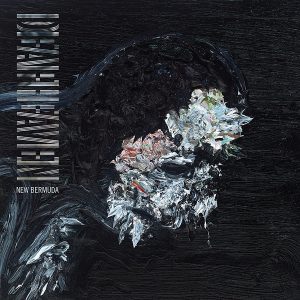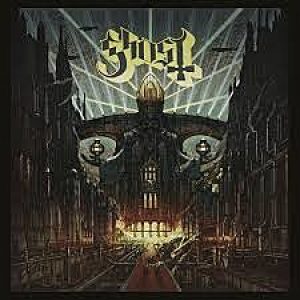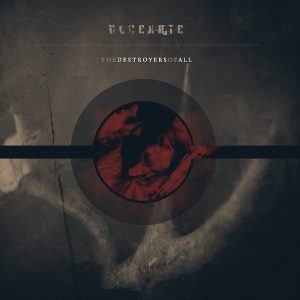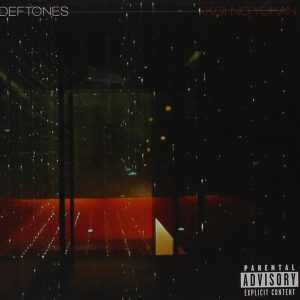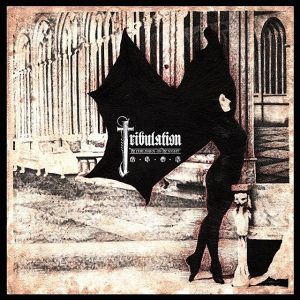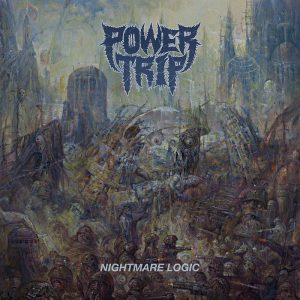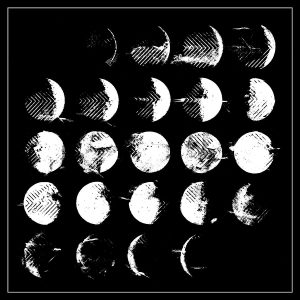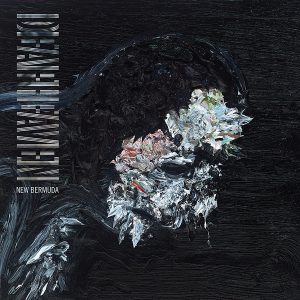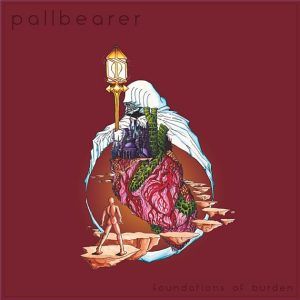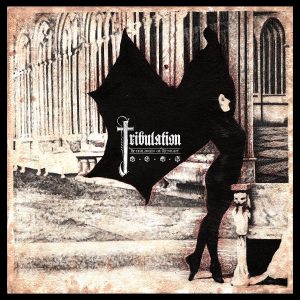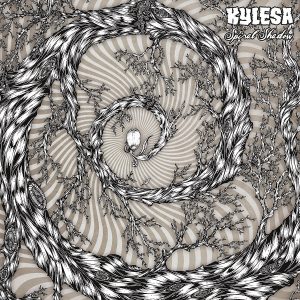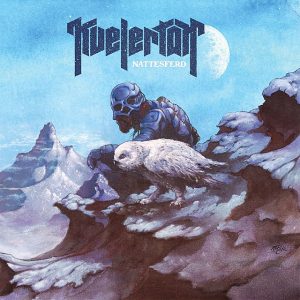As far as how metal’s year went: pretty much the same as always. Lots of excellent throwback death metal (turns out I like the stuff when it doesn’t sound shitty), some welcome returns, and some promising newcomers. That’s really all you can ask for in a genre that’s over a half-century old at this point. That’s assuming you consider “Black Sabbath” by Black Sabbath on Black Sabbath the genesis, which I do, even if it took another few years for the genre to codify. Not a lot of innovation – oh boy, nu-metal’s back – but a lot of bands are doing some interesting stylistic kitbashing. I may even remember some of them next year!
Also, if you’re looking for some archival recommendations, I’m gonna once more plug my ongoing review project at The Shfl.
…
Honorable Mentions:
20. Lamp of Murmuur – Saturnian Bloodstorm (Argento Records/Not Kvlt Records, USA)
19. Voyager – Fearless in Love (Season of Mist, Australia)
18. Jesus Piece – …So Unknown (Century Media, USA)
17. Malokarpatan – Vertumnus Caesar (Invictus Productions, Slovakia)
16. Frozen Soul – Glacial Domination (Century Media, USA)
15. Final Gasp – Mourning Moon (Relapse Records, USA)
14. Mutoid Man – Mutants (Sargent House, USA)
13. Blood Ceremony – The Old Ways Remain (Rise Above Records, Canada)
12. Mammatus – Expanding Majesty (Silver Current, USA)
11. Outer Heaven – Infinite Psychic Depths (Relapse Records, USA)
…

I usually reserve the number ten slot for something offbeat that brought me a lot of joy over the past year. Usually, it’s from Japan. Gacharic Spin have been spinning their infectious funk metal blend since 2009, but this is the first album of theirs to make it into my rotation. They throw everything into a blender here and emerge with a delicious chaos smoothie. Listen to “Kachi-kachi Yama” and you’ll know what it must’ve felt like to see the Red Hot Chili Peppers in 1986 – without the risk of getting hit with a dick sock!
Listen here.
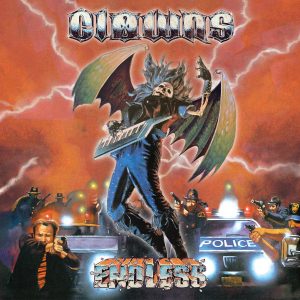
Between indie darlings Dream Wife and Australian arsonists Clowns, queer women were responsible for some of the most vital punk rock of 2023. Clowns fall more on the crossover thrash side of the gender spectrum. The 80s-style power chords provide the perfect backing for Stevie Williams’ charismatic screams about touring life, her stabby tendencies, and her desire to bangarang every member of your family. It’s no laughing matter.
Listen here.
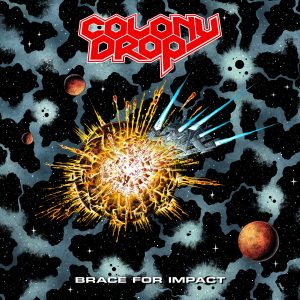
A colony drop is the ultimate “fuck you” move in Gundam – literally yeeting an inhabited space station into a city for maximum annihilation. Frankly, it’s pretty rude. Seattle multi-thrashers Colony Drop achieve the same effect with their music, only without as much loss of life (although I’ve never been to one of their shows so I don’t know how brutal their pits get). Big eyes, small mouths, huge riffs.
Listen here.

Sporting the brightest production we’ve heard yet from these veterans of the psychic wars, Baroness’s first step off the color wheel may seem off putting at first to those who prefer a little more mud in their swamp metal. And yet, their penchant for songcraft remains intact. “Last Word” and “Shine” bring the rock, but it’s on weirder entries like “Choir” and “Under the Wheel” that they truly roll.
Listen here.
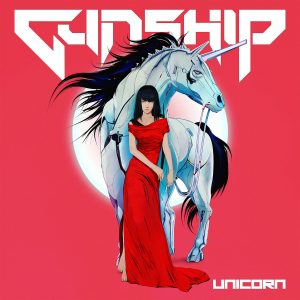
Neon metal from a trio who grew up in the ’80s (and therefore only remember the good shit), Unicorn is that rarest of beasts: a synthwave-influenced hard rock record that actually lives up to its promise. They pull in friends like Gavin Rossdale, Dave Lombardo, Tim Capello (aka oily sax guy from The Lost Boys), Carpenter Brut, and Health to help them out, adding extra spice to brightly-colored bangers like “Monster in Paradise” and “Weaponized Love.”
Listen here.
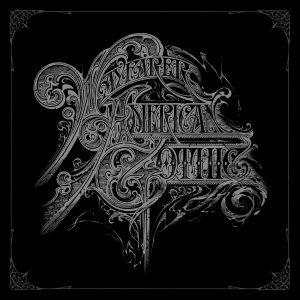
The Wild West gives a potent backdrop for metal records. The desolate landscape, sudden violence, and ambiguous morality seem tailor-made for the genre. Shame more bands don’t head out to Dodge City, but Wayfarer certainly do the concept justice. Combining black metal with Western (the genre) guitar twang elevates both styles as they empty their six-shooters on two-fisted tales like “To Enter My House Justified.” American Gothic depicts a dark time in American history. It’s Wayfarer’s finest hour.
Listen here.
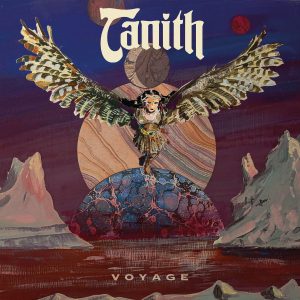
Satan guitarist Russ Tippins named Tanith after the female lead of the 1968 Satanic cult film The Devil Rides Out. Dude can’t stop shouting at the devil. Just as that esteemed NWOBHM act are going through an unprecedented renaissance right now (Earth Infernal made my Top 20 last year), this feels remarkably vibrant for a new project from a legacy artist. This takes the absolute best parts of phase one Rush, peak Thin Lizzy, and Blue Oyster Cult and makes them fresh – check out “Flame” for your D&D party’s new anthem.
Listen here.
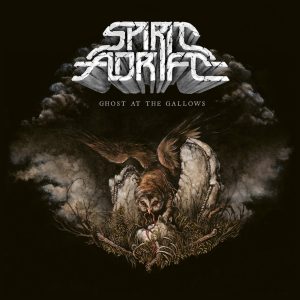
Nate Garrett and his cohorts only get better as they make their way through the alphabet. Like, to the point where people kinda take them for granted. Their “G” album received rave reviews but not much buzz that I could see (although I’m admittedly absent from Musk’s Folly); folks just assume they’re gonna release transcendentally epic metal with each new release. And sure, those strawmen aren’t wrong, but still–Spirit Adrift deserve a little more appreciation for just how much “Give Her to the River” and “Hanged Man’s Revenge” smoke. Thanks, Nate and company!
Listen here.

How many bands put out their best album thirty years into their career? Yes, you can throw a dart at Enslaved’s discography and hit a great record, but there’s a strong case to be made for Heimdal as the most ambitious – and most successful – effort of their prog era. You would never be able to tell it’s a concept album based on how well each individual song works. While “Caravans to the Outer Worlds” might be the best thing they’ve ever done, everything else on here comes a close second. This is how black metal should be done (even if it means jettisoning a lot of the actual black metal).
Listen here
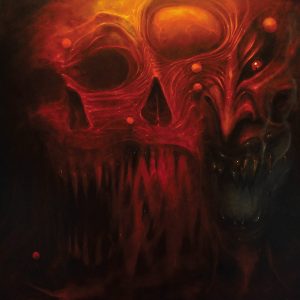
Yeah, yeah, it’s the obvious one. That’s for a reason. I actually had to fight (although not very hard) with my esteemed editor at Decibel to let me give this one a perfect score, but if this isn’t a 10, what else is? Horrendous, already at the top of the progressive/tech-death game, broke through the plateau they’d hit on 2018’s Idol by blowing up their sound and rebuilding it into something altogether leaner and meaner. You can try to pigeonhole the genre, but they honestly pull from so many different places that it’s just metal, in the modern and best sense. Check out “Neon Leviathan” or “Cult of Shaad’oah” for proof.
Listen here.
It wasn’t all metal this year, as evidenced by attendance at Hartford CT’s Pokemon Regional Championships with my son, a stop at Stowe VT’s famed Alchemist Brewing, a trip to Disney World in August where my family, and I nearly melted or an auspicious afternoon at a Golden Girls-themed brunch in NYC. Below are the 20 albums that are most representative of the wild and varied year that I had, some from bands you know, but a good amount of discovery awaits for you as well. Let’s make sure 2024 keeps the heaviness and variety flowing like this year already did.
…
Honorable Mentions:
20. Organ Dealer – The Weight of Being (Everlasting Spew, USA)
19. Cruel Force – At the Dawn of the Axe (Shadow Kingdom, Germany)
18. Smoulder – Violent Creed of Vengeance (Cruz Del Sur, Canada/Finland)
17. Hellripper – Warlocks Grim & Withered Hags (Peaceville, Scotland)
16. Royal Thunder – Rebuilding the Mountain (Spinefarm, USA)
15. Filth is Eternal – Find Out (MNRK Heavy, USA)
14. Helms Deep – Treacherous Ways (Nameless Grave, USA)
13. Blood Ceremony – The Old Ways Remain (Rise Above Records, Canada)
12. Godthrymm – Distortions (Profound Lore, United Kingdom)
11. Church of Misery – Born Under a Mad Sign (Rise Above, Japan)
…
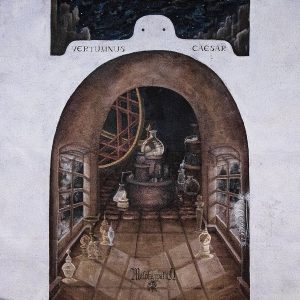
The Slovakian masters of black metal return with their last folk laden dirge into the Tatra Mountains and the medieval themes of Slovak histories. Their fourth album Vertumnus Caesar is more of what you expect from the band as they continue to draw inspiration from traditional heavy metal structure with more black metal vocal styles and ambience.
The band throw the kitchen sink at the listener with how they are able to turn on a dime giving way to stylophones, Moogs, bongos, tubular bells, and whatever else they feel fits their unique representation of extreme metal. First proper track “Koár postupuje temnomodrými dálavami na juhozápad” hits a ton of variety and gives way to the rest of the album’s bipolar nature, which is ultimately somewhere between the first and second waves of black metal with a distinct flair for their homeland of Slovakia—Frankly it not only needs to be listened to, it needs to be experienced.
Listen here.

Right from the opening vocal attack from the title track, lead singer Joseph Schafer demands that you “Brace For Impact.” Coming from the vibrant and growing scene in the Pacific Northwest which Schafer and I spoke about during the album’s streaming premiere, Colony Drop use a wide range of styles that get thrown into their baseline of crossover thrash from which this album was ultimately built.
The self-proclaimed purveyors of “High Speed, Twin Lead” do not hide their adoration for the forebears of the genre that helped forge the fires of heavy metal within guitarists Ben Burton and Ryan Moon. Masterful tracks like “The Clockwork Grip” and “Fantasize The Best” showcase a “castle full of traps” approach that would make the nearest Metroidvania fan blush, allowing listeners to discover more and more nuance through each diabolical dirge through this scorching debut.
This album is definitely a grower and one that reveals itself more and more on repeated listens, with each minute detail showcasing the band’s spectacular attention to detail, like finally finding that missile tank after walking through the same corridor 20 times. You never know what is lurking around the next corner.
Listen here.
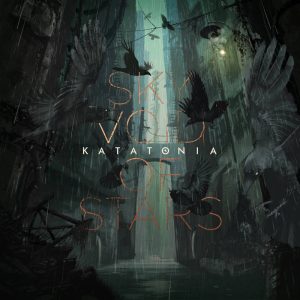
Reigning kings of Sweden, Katatonia continue to cement their legacy as one of the best bands in the world. On Sky Void of Stars, they advance their goth tinged rocking metal, tugging at your heart strings in a way that isn’t seen as often these days.
On “Austerity” Jonas Renske gets to properly ply his trade with beautiful vocal lines that draw the listener in, giving way to a wall of effects and guitars to allow this to properly marinate to maximum effect. “Birds” is more of a straight forward, rocking number that has more bombast on drums than the rest of the album and gives you a good amount of energy to balance out some of the moodiness of the slower tracks.
It amazes me that a band that has been around as long as they have is able to sound so fresh in 2023, but here we are. Katatonia have released their best album since The Great Cold Distance, and the result is exactly what you want from Katatonia, somber, moody, and stunning.
Listen here.
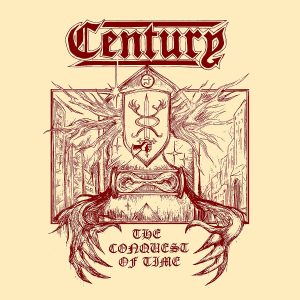
This was an interesting year for heavy metal with the return of Heavy Load, a dynamite debut for Helms Deep (see above) more from recent success stories like Haunt and Spirit Adrift, and then some. Enter Century, one of the more surprising additions to my list. This Swedish duo’s debut is pure classic tinged heavy metal that gallops along without having to be over the top and given the country’s pedigree especially with this subgenre, there was a lot to live up to.
Tracks like “The Fighting Eagle,” “Master of Hell,” and “Breakthrough” allow this trad twosome to take flight, leaning heavily on the guitars and vocalist Staffan Tengner’s delivery style with production evocative of European bands 40 years their junior. If you are looking for an album that hearkens back to the days of yore in Sweden, a time before death metal reigned supreme in a place once called Svithiod, look no further than the latest scorching stylings of Century.
Listen here.
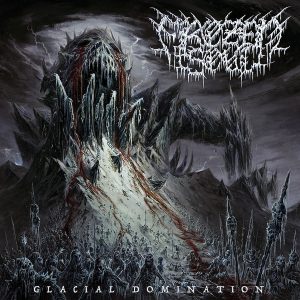
In a battle for death metal supremacy in 2023, there were a lot of contenders, legacy acts like Autopsy, Cannibal Corpse, Obituary, and Dying Fetus all released good to great records, but it was 2 albums from newer bands that managed to make this list (more on that below). I had listened to this record exactly once before speaking to Frozen Soul vocalist Chad Green and guitarist Michael Munday before our album breakdown, and I could tell that there was something special happening here that wasn’t a part of their phenomenal debut Crypt of Ice over two years ago.
Guitar solos and sections of melody allowed Frozen Soul to properly flesh out their songs in a way that added proper growth and depth to take their sound to the next level. While the early part of the album is similar to their debut, it’s the latter half where the band’s new sense of freedom is on full display with the title track and the blistering “Assimilator”. The former track shows off the melodic flair that is positioned well between their militaristic crawl through a minefield. The latter track is a culmination of all things Frozen Soul past and present with an eye towards LP three, all the aforementioned dynamics are contained with and make for a winning formula that the band isn’t likely done with. One of the hardest working bands in death metal and for good reason.
Listen here.
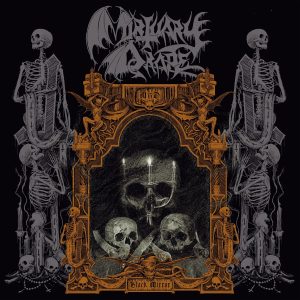
When I am in search of new extreme metal, black metal is usually one of the last places I go to find something new which is interesting considering that I have two black metal albums in this top 10; it helps when two of my favorite black metal bands drop an album within the same year. Italy’s greatest extreme metal treasure, Mortuary Drape, have been plying their blasphemous trade for nearly 40 years, and with their last album, Spiritual Independence, a masterpiece in its own right coming all the way back in 2014, who knew when the next chapter would arrive?
Luckily, 2023 was the right time for Black Mirror, the band’s sixth album overall, featuring all the same things that make the band who they are: demonic vocals, fast and furious riffs, plus the absolutely crushing bass lines that litter all of the best songs that The Drape have ever recorded. Album opener “Restless Death” is no exception to this formula as SC’s bass wobbles and vocalist Wildness Perversion channels the demonic dynamics that he established on All The Witches Dance and has continued to fine tune since.
The Drape can also do blisteringly fast sections and with that too go the basslines, an odd delivery of vocals from Wildness Perversion have him sounding like an evil wizard evoking spells to be cast upon unsuspecting listeners all while the bass keeps pace with the other guitars and is very high in the mix as always. My favorite black metal release of the year, one that deserves more press than it has been getting.
Listen here.

Returning with an unchanged lineup from the Gold & Grey sessions arrives Stone whose sense of cohesiveness and stability is evident from the album’s first riffs and the one-two punch of “Embers” and “Last Word,” a song that is best reflective of the whole that represents Baroness in 2023. Guitarist Gina Gleason really gets to show her stuff here as her lead duties and guitar solos complement main man John Baizley’s own trademark riffs and guitar tone complete with soulful singing.
The recording of this beast was a unique endeavor that Baizley, Gleason, and drummer Tristan Thomson spoke about at length around the release of Stone. This radio-friendly heaviness is most comparable to their fourth album Purple in how easily digestible tracks like “Beneath The Rose,” “Anodyne,” and “Under The Wheel” are. Baroness are a gruff band with enough polish to garner fans from outside of the realm of metal and rock, and their powerful reach and work ethic set them apart from many of their contemporaries as they continue to age like a fine wine.
Listen here.
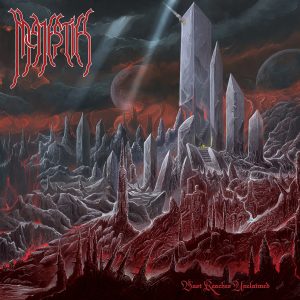
If you told me that a melodic death metal album not recorded by Carcass or At The Gates would have made my year-end list at this time last year, I would have called you a liar. It took the herculean effort of Inexorum’s Carl Skildum and Matt Kirkwold along with Obsequiae architect Tanner Anderson to make it happen—enter Majesties and their spectacular debut Vast Reaches Unclaimed.
I spoke to Skildum about what brought this project together and went through the minute details of this record too. Right down to the artwork, the band nailed the mid-90’s Gothenburg style of melodic death metal, adding in the castle metal sections that Anderson typically employs in his current main musical vehicle.
Just one listen to “The World Unseen” and “Across The Neverwhen” from start to finish would have been enough to accomplish this feat, but there are still eight other songs to sink your teeth into. This is the kind of album that toes the line between extreme and beauty on every track, leaving no stone unturned; luckily I have had the pleasure of this being part of my listening experience of 2023 since around February. This one was always high on the list and for fans of the bands contained within this project it is an easy selection, giving a bit of a different look to their already prolific profile.
Listen here.
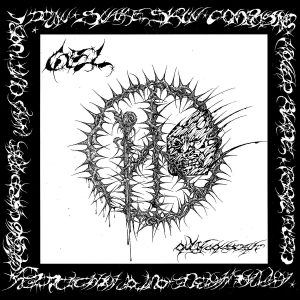
Another mainstay of 2023 was the hardcore stylings of New Jersey’s Gel, a powerful group of road warriors that were nearly unmatched by year’s end. Right from the opening seconds of “Honed Blade,” it is apparent that the fury here is tough to match, and the abrupt nature of this record allows for the transition to “Fortified” to hit all that much harder. This is only a 17-minute album but it covers a lot of hardcore ground, some blasting drums, and even the humorous interlude of “Calling Card” allow for you to get your money’s worth and having the ability to listen to it 3 times in one hour is a tempting proposition for hardcore stalwarts.
I spoke to guitarist Anthony Webster in March about what makes this band so special, having toured with big names like High on Fire and Drain with a live show that also needs to be experienced. This isn’t just for the new hardcore fans; it’s for the old ones too and who could forget. This is hardcore for fucking freaks; that’s it. The new face of hardcore is NJHC, and Gel have to be at the forefront of this movement.
Listen here.
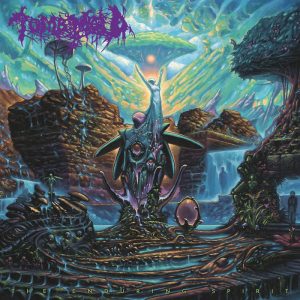
Having thought that my album of the year was done by October, it took a surprise record by one of the best current faces of death metal to make me reconsider and eventually change my mind. Tomb Mold are no strangers to my year end lists as they have been a part of them since the release of 2018’s Manor of Infinite Forms, but they were MIA for a few years. When they arrived back into my consciousness in 2023, it was abruptly released, something that happened with a few other albums this year.
By the time you finish the album’s third track, “Will of Whispers,” you will have taken in some beautiful jazz fusion sections from bassist Derrick Vella, complemented by Max Klebanoff’s growls and Payson Power’s riffs. Tomb Mold have never sounded more progressive than they do on The Enduring Spirit, not like they had to be either, but their experiment in death metal paid off unlike some of their contemporaries this year. “Servants of Possibility” almost comes across like a new ethos from the band, allowing for them to employ some new sounds juxtaposed against what they have been doing for three albums and nearly 10 years to this point, but this new album is the top of their collective heap, besting Manor for what is their best work to this point.
This was a powerful and mixed year in extreme music, so why shouldn’t a surprise album release from October be the best? Better late than never, The Enduring Spirit is the album you need to compare all death metal current and future against.
Listen here.
See something we missed or have any thoughts? Let us know in the comments. Plus, as always, feel free to post your own shopping lists. Happy digging.
Send us your promos (streaming links preferred) to: [email protected]. Do not send us promo material via social media.
Upcoming Releases
Blood Incantation — Luminescent Bridge | Century Media Records | Death Metal + Ambient | United States (Denver, CO)
This new maxi-single gives us a death metal track on side A, backed with an instrumental ambient piece. Remember, if you don’t listen to both halves, you are certifiably not cosmic.
–Ted Nubel
…
Tomb Mold — The Enduring Spirit | 20 Buck Spin | Death Metal | Canada (Toronto, ON)
Surprise-announced earlier this week and digitally dropping today, The Enduring Spirit is a bold step forward from the Canadian death metal group. Dreamlike progressive elements play a big role here, but so does riff-packed death metal. It’s a strange combination, but a fun one.
–Ted Nubel
…
Baroness — Stone | Abraxan Hymns | Progressive Sludge + Rock | United States (Savannah, GA)
From Tom Campagna’s interview:
[Stone is] much more simplistic by design when compared to the grandiosity of its predecessor. Recorded in a country home in the middle of Pennsylvania during Covid isolation, this record is the sum of its million little pieces, whether that be stick clicks, birds chirping or even the squeak of a stool, it all made its way to this sixth record as part of their lexicon.
…
Brujeria — Esto Es Brujeria | Nuclear Blast | Death Metal + Grindcore | Mexico
Mexican metal staples Brujeria are back with another record. It’s their signature blend of pissed off aggression and catchy metal riffing, and we’re glad they’re still at it—and seemingly getting better with age.
–Addison Herron-Wheeler
…
Flesher — Tales of Grotesque Demise | Redefining Darkness Records | Death Metal | United States (Indianapolis, IN)
From Ted Nubel’s track premiere of “The Gates”:
Hailing from the perilous plains of Indiana, the band’s death metal leans heavily into annihilating groove; it’s old-school death metal intentionally shaped and disfigured into a grisly vessel for horror-obsessed riffs. Speaking of riffs, Flesher’s approach to riffs has more in common with the belligerent pounding of war drums, or, perhaps, a meat tenderizer, than anything melodic […]
…
Fabricant — Drudge to the Thicket | Profound Lore Records | Technical Death Metal | United States (California)
Fabricant don’t play death metal, it’s just that the music that exudes out from them–the ornate riffing, the vigorous tempo changes, and the blatant desire to rub up against song structures but never commit to them–just happens to be death metal. Their debut albums plays like it was a meticulously planned experiment that took 13 years to complete, which isn’t too far from the truth.
–Colin Dempsey
…
Oblivion Castle — Witch’s Lament in the Moonlight | V.C.H. Music | Black Metal | Mexico
I’ve lost count of how many albums V.C.H. has released since 2020, but her high batting average continues with Witch’s Lament in the Moonlight. Oblivion Castle’s preceding EP Sorcière was one last year’s best, and while Witch’s Lament in the Moonlight moves away from the project’s organ-led black metal roots, it’s a much stronger total package.
–Colin Dempsey
…
Tumultuous Ruin — An Abscess on the Heart of the State | Fiadh Prod | Raw Black Metal | United States (California)
This one-man raw black metal project is surprisingly large. Don’t be mistaken, it’s still as fuzzy and desolate as politically-charged metal of this style should be, but it’s more intentional. Every element floods the mix without pushing the speed limit, meaning An Abscess on the Heart of the State sounds larger than it appears.
–Colin Dempsey
…
Violent Life Violent Death — Break.Burn.End. | Innerstrength Records | Metallic Hardcore | United States (North Carolina)
Violent Life Violent Death’s debut album is a chunk of old-school metallic hardcore, congealing the same scorched earth approach as Ringworm or Integrity with acidic vocals. It’s as outwardly spiteful and chock-full of riffs as music such as this should be.
–Colin Dempsey
…
Tar Pond — Petrol | Prophecy Productions | Doom Metal | Switzerland
It’s a measure of a band’s mettle when their riffs can pierce your heart rather than your sympathetic nervous system. Tar Pond’s second album is constructed around such riffs. Rather than excite, they drag you down into your feelings.
–Colin Dempsey
…
Thorn — Evergloom | Transcending Obscurity Records | Death + Doom Metal | United States (Phoenix, AZ)
There’s a sweltering psychedelic sheen to Evergloom, adding a radiant tint to its viscous (no, not a typo) mix of death and doom metal. For a death/doom band, I should note that Thorn moves pretty fast – this is their first release in 2023 following a full-length and two splits in 2022, and it shows off an elevated, bizarre new side of the band.
–Ted Nubel
…
]]>I spoke to vocalist, guitarist and founding member John Dyer Baizley and drummer Sebastian Thomson about a myriad of things spanning from the recording process, which included using the particular space of an AirBnB and how it made the recording of the drums its initial focal point. The use of obscure and random sounds and archaic, poorly maintained instruments helped the band recall limitations they once had–now, with their much more refined chops they’ve been able to create a visceral Venn diagram of their eras to create this newest iteration of the band’s sound. We spoke about the deeper meaning behind Stone and what it meant to John and Co.’s creative process, resulting in what he calls “hypnotic simplicity”. Read on below for a very in-depth piece on this great new addition to the band’s library.
…
…
What was the inspiration for simplifying things and making it a little less grandiose on Stone?
John Baizley: I think it was a practical thing in that we had made the decision to essentially make this record ourselves. In some ways we didn’t want to get confused and lost in a project that was already going to be a major piece of work for us. Specifically in recording if you can realize a boundary, it frees you up and allows you to continue to have a very simple starting point for the next record, which is for us to look back 1 album into the past and identify what was a critical standout or a fundamental feature which is this case was Gold & Grey. It was an album which was about the layers, overloading, grandiosity, and all the embellishments; an all-out audio war. We wanted this record to simply not be that, like with Gold & Grey we were looking back at Purple and those songs were really tight and compact which created the idea for Gold & Grey to be much more cinematic with that. It makes sure that each successive record has a huge fundamental difference. It’s so that we can use everything we have done in the past without feeling repetitious and that’s fine enough for me, its not like I am not going back to Purple to figure out what went well since it was 2 albums ago.
When I was listening to Stone, I was gathering more of the aesthetics of Purple. In terms of song length it was also more compact, Purple is probably the easiest record of yours to listen to up to this point.
JB: Some of our records genuinely require a few listens to dig into. I remember when we put out Red Album and Blue Record we had some close friends and confidants to play the records to. They always had this kind of surprised response of “there is a lot going on here”. It was never really the goal of this band to write for anyone else, so if it takes a few listens to unfold, I learned very quickly that is a good thing. As a band I don’t think the strength of Baroness is that we write simple and easy to digest songs. Internally we hold ourselves to a high standard and are constantly trying to absorb outside influences that help to push us forward.
We certainly sensed that this album was going to be a bit leaner and more muscular. It is not always a goal of mine to capture a live feel when recording, and it wasn’t, but in the studio we try to ignore reality and almost create a super reality for the listener. On stage, I don’t give 2 flying fucks about what we recorded, because we already know that we created a song that works there. My goal in the studio since we have all this equipment and this one opportunity to get it right and to try and elevate it beyond just the four of us. Sometimes that means you add or subtract; the focus on this record was on capturing a certain kind of energy. We rented an AirBnB and hauled all this equipment that I have been collecting for years into this giant cabin out in the woods. We spent that time rehearsing songs that we had never played together before. Because this was during the throes of the Pandemic. We made the studio space the rehearsal space, and then the recording space. We worked in pairs of songs 10-14 hours a day, totally musical fitness, getting ourselves in shape, developing chemistry and depth with the songs.
Once we had the arrangements locked in, but before we knew all the specific details about what everybody was going to do before drum fills had been considered, I asked Gina what chords she was playing, all of this before any music theory looking for unique takes each time. Leading up to this I felt we lost a long time ago with the band with all the lineup changes, was that the chemistry of the band was more focused on bringing people in, which took away from our ability to improvise as much. This was the first time between records that had the same lineup as before, we finally turned that corner personnel wise and we have that chemistry and it allowed us to do as much as we wanted. For instance, a song like “Choir” was a full-on improvisation with no structure, no form, no arrangement whatsoever, played it, liked it and made it a song without adjusting anything. We had the opportunity to do it ourselves, it puts us in a headspace where everything we do was on our own, internally confined only by the limits of our own creativity, we had no producer and it allowed us more time to take different routes to be creative. It would have been a great waste of time in the studio. There were more human moments to live and breathe throughout the music. It could be a squeaky stool we were sitting on or Seb speaking, we even have a song that starts with a stick click, it seemed like moments like that were critical to the recording. It was much more similar to how we prepare for tours.
At the end of the day there are only 4 people responsible for the content of the album and hopefully it turned out exactly the way you wanted it to be.
Sebastian Thomson: Even though this was a new thing for us, the cabin seemed like something Baroness did before I joined. Kind of like just messing around and having fun with your friends, much less formal.
JB: It was fun, we made fun decisions. We were like “what would be fun to do that we’ve never tried to do before?” What are some ideas that we have heard of but have never put into practice. It was about the overarching concept that we applied to our creative process; we started as a very DIY band playing in some basements and such. There is a whole portion of our career that was not in a professional space, I think about my musical upbringing and the earlier stages of the band, it was fun to struggle. I don’t think that this band has ever lost the propensity to struggle, this record might have been a break from that since the band had the same members; we maintained the creative control to do what we do. The more that we were able to do the more fun we would have. Let’s do what we’ve been talking about and put the rubber to the road. It was excruciating at times but it was overall a fun record to make.
What was the cabin space like?
JB: I think we wanted to be in that cabin space with a great drum sound, the place sounded excellent for drums.
ST: I walked in and clapped a few times in the main room and knew that the place had the sound we wanted.
JB: If we were able to, we would love to go back to this house and record the next one. The experience was just so cool, we had a plan and an angle, but we lacked the minute details. We sort of had to rely on the 4 of us internally to keep us moving. We just worked and didn’t need many breaks, it was a purely creative and supremely rewarding experience. I think the records are overall about the recording. We really try to let the studio guide us in the decisions, whether that be a restriction or the space itself. All of it becomes a part of the record. In the beginning of “Magnolia” you will hear birds chirping and wind blowing, we set mics up outside and Gina had to play an acoustic guitar in 28 degree weather but those intricacies make for a unique recording that are inseparable from the album itself. There is a burst of wind that takes out the guitar sound for a moment, which instead of scrapping it, it ended up sounding cool instead. The unexpected parts added to the authenticity.
When I listen back to a song like your single “Last Word” there are some big riffs. What was it like writing and recording that song in particular?
JB: That one I think from my memory of making that song and making it a single, is that more than any individual song on the record was that it had equal input from the four of us. The arrangement and the music itself. It is based on a song that Gina wrote in the Pandemic sessions and we learned it as a four piece, Nick wrote the chorus, Gina wrote the riffs, I wrote the verse and Seb and Nick had a rhythm workout at the end, it was a good example of the musicians that we’ve become. It isn’t always the case with writing our songs, it usually isn’t just one person writing these.
It is a good example of what the band is trying to do for Stone. A bite-sized portion.
JB: In terms of sequencing this is the only way that Stone would work.
You had talked about “Choir” before, it also felt like “The Dirge” was transitional as well, did you feel the same way about that track as well? Was it as improvisational as the other?
JB: That’s actually part 3 of a trio, it starts with “Beneath The Rose”, continues into “Choir” and finally “The Dirge”. I think of them as a single piece of music with 3 songs within it. “Beneath The Rose” was written around a riff that we had from the Gold & Grey sessions which was almost a full song then, but it didn’t quite click; it was one of the first things I worked on during Stone. We were just jamming; the whole track was built on a tempo and a key. We had recorded 3 versions of the song, the one on the record was the first one because it sounded the coolest; it sounded like we maybe had an idea as to how the song goes. We didn’t have a goal other than doing something cool and using some of the strengths that Seb has in terms of being a krautrock and rhythmic guy.
ST: That track feels like a very important moment for Baroness; it is very baroque and dense. The post rock thing is very minimalistic and we found a way to do the Baroness version of that, which turned out to be very cool.
JB: It was the kind of thing we talked about since Seb joined on Purple. Sort of hypnotic simplicity which we tried for during Gold & Grey but it came out to be one of the most complicated things we ever did. This kind of minimalism isn’t outside our influential wheelhouse, we just had never taken the risk to dedicate ourselves so fully to how a song is written. We had to ignore our typical Baroness instincts and more on our internal chemistry. There were a few moments during the recording where there are chords and Gina would say “we shouldn’t know what each other are playing, because then we are going to play something that just makes too much sense.” We wanted to use some of these moments that we have during our live show where we give the crowd a break, instead more of a musical dialogue. We use it on the record to give a reason to develop a deeper chemistry but doesn’t require a ton of synchronization, it requires where the dynamics of the song are going and listening to your bandmates in kind of a fluid way. It was like we unlocked a new sonic landscape for ourselves. Moments like that are really exciting.
ST: I think it works really well in contrast to the main body of Baroness, it works out and is harmonically more complicated, but you throw something like that in there once in a while.
It reminds you that while you are a band, you are also 4 people with unique musical backgrounds allowing you to input some individual flavor into your songs.
JB: With “The Dirge” it was written after a good portion of the rest of the album, it was a gentle, quick and meaningful song at the end of the three-part section. Gina and I were using acoustic elements even in our electric songs quite frequently, we didn’t need the gimmick of ending the record with an acoustic song, we needed the acoustic sound to be such an important part of this record so that it becomes much more than a bookend. I was watching a movie where there was a scene where 2 women played an open mic night and played some simple chord progressions that I liked. I had my acoustic and I played along and I started to sing along and changed some of the riffs, but it came together quickly with minimal instrumentation. Gina’s grandmother was emptying out her place and she had a Lowrey organ; the thing with all the buttons on the top with like 10 dead keys on it. It had a cool sound and we wanted to include it on the song, among others. The record is so fun to me with all of these types of moments; anything that’s within arm’s reach can become part of the eternity of Baroness especially because it is recorded. That kind of open-mindedness comes through on the record.
When the moment strikes, you never know what will happen. It reminds me of one of my favorite Smashing Pumpkins songs, “Mayonnaise” where Billy Corgan used a crappy little guitar, but he liked the sound it had. Anything is worth trying out.
JB: Gina and I had been listening to a band called Amps For Christ and there is a song called “Edward” that sounded like it was recorded on a Walkman. It was a lo-fi recording so we limited ourselves to using substandard equipment because we liked the vibe of it. Sometimes in the typical band, producer, engineer situation with multiple people involved looking for equipment as such would be a glorious waste of time and money.
You have to remember how things were when you started out as a band, you knew nothing but substandard equipment.
JB: Or more purely when we were young and we had nothing but limitations, both technically and everything else, we were still making things, just because you have the world at your disposal doesn’t make it easier, in fact it can be needlessly complex at times. With no real worry about wasting time and our sole involvement we are allowed to have that level of creativity.
Why Stone, in terms of the name of the record?
JB: When we had been previously engaged in our color-themed records; it was always conceived as a finite project. I liked simple titling structures which started with Red Album in 2006, something in terms of the colors records, we never thought we would finish, which became a 15 year cycle, it was nerve-wracking that it was ending because working within that series that had no concept of meaning, but more a concept as titling and direction. When Gold & Grey was done, I was internally trepidatious about what we would do next, because it was usually easy; it was scary. The thing I realized about that is that I loved working within that series and the idea was to just transition from one era into the next and nothing needed to change inexorably. Where Gold & Grey was the last piece of that particular puzzle and then Stone became the first piece in the next one.
I had been taking a great deal of inspiration daily from this cemetery behind my house called West Laurel Hill; it had gorgeous old mausoleums and is an amazingly serene, peaceful and large place. When you think back to all those turbulent years that we all struggled with, I found some calm and meaning that translated into lyrics and music; the lyrics were last and the hardest part of the record to do; we took a break from the music and then I had to come back to write lyrics to songs that were essentially done otherwise. The 4 of us had gained a level of stability that we hadn’t otherwise had before; it was a cornerstone, a foundation for us; I was literally surrounded by stones. The real difficulty for me on this record was finding that lyrical content, which isn’t a small portion of the record, it’s huge. I worked for like 10 months on the vocals and within the spirit of the record: not overthinking it. I know that I can’t overwork something which was a weird pressure which felt to me. It reminded me of Greek mythology and the fate of Sisyphus who was punished by having to push a stone up a hill daily and after achieving it had to repeat the task infinitely. The idea of these repeated processes only to yield nothing, but I started to realize that there may have been something there to take away from it all. It was ok to throw something away that I worked hard on and start anew.
It wasn’t that I can’t do this, it’s that what I tried yesterday didn’t work. It was a personal aspect of the title for me. One thing that is important for our records to reach the proper audiences is that we don’t always spell out to our fans through the songs or album titles. Ultimately, we are not telling a story of one person, however one of experience, absorbing the world around us and reflecting on them through the lyrics. I felt that Stone had all these symbols that were relevant to me and the rest of us which were conceptual and more personal, something that our more intrepid fans can kind of dig through. It worked on the foundation that all our records worked out from and clearly signaled a sea change for something.
“Shine” seems like a pretty heavy song in terms of emotional weight. How do you go about conveying that heaviness in song form?
JB: I think that with our songwriting chemistry, I tend to lean towards the personal, emotional, dark and melancholic; those are the colors that I tend to paint with musically. It seems like Gina and I have a tendency to move towards sweet and sad seeing as we are singers and songwriters, Nick and Seb on the other hand are able to inject energy, enthusiasm and swagger which may be contradictory to what we are trying to achieve in a set of lyrics or the chord progression which can be dense, but through the rhythm team of Nick and Seb they make it lively and balanced. If we want to constantly match that dynamism it would just teeter off into stupid rock n roll. In effect this band has always been and always will be a combination of contradictory ideas kind of meeting in a center point and feeling unique. That song bluntly is about loss, there were several people in my life that I lost during the recording of this record. I wrote a song about the loss and spaces that people leave behind. I wouldn’t want the song to feel that way the entire time. Music isn’t about making someone feel sad or happy, it is much more nuanced and more difficult and ultimately more rewarding when you give these things layers to unfold over subsequent listens; I felt that this was one of the best choruses at least musically that we had ever written.
The record certainly seems to allow itself to be understood more on each listen, with all this nuance going on the next listen will be the one I walk away with the most to this point.
JB: I think it will be fun for people who have the energy and curiosity of listening to it that much, I think more than any of our other records there is a good throughline for this record even for how diverse it is; a steady narrative. With our former records there are still hidden moments that I discover when I have to listen back to them. Our goal is always to record something that we would want to discover on our own. I think that adds an element of us being able to make these discoveries as we write, we are trying to prove our capabilities as songwriters; an album that would blow me away. I think that using the language of music with a band like this draws you in and creates enough mystique that you want to hear it again. I don’t think the cerebral aspect of the record comes out until 3 or 4 listens; a grower instead of a shower. I didn’t realize that at first, but during the mastering process I did. We have become better at creating a well-balanced and nutritious meal.
As far as getting out on the road I see that you have some regional openers from Sheer Mag and Imperial Triumphant, Escuela Grind, KEN Mode and Soul Glo. How do you go about curating shows such as these?
JB: I’m a fan of all of them, bands that are doing something exciting right now. It has been an incredible year in terms of the extreme side of music. Being that this record to us is a reaffirmation of our DIY attitude towards this band, it was important to have support bands that match that sort of energy as well. Sometimes you get so big as a band that you lose track of who your openers should be, maybe it isn’t always that well-seasoned act, I don’t think any of these bands would do a full tour with us, so we decided to work regionally. We aren’t always the easiest band to package up, we are always a little outside of someone’s zone.
ST: We don’t fit neatly into one of those 15 categories; it is always a confusing discussion.
JB: We talk about this all the time about who we are and what we want that’s realistic, what we like and what works for us. It is about freedom and presenting us in the way that we want to. I had a lightbulb moment at a Full of Hell and Blood Incantation show and I realized that the fans there are our fans; familiar faces. I feel at home with these people, why wouldn’t we have them at our shows? I think most of our fans are familiar with this, super rad bands that will keep us on our toes; lots of raw talent.
ST: It is also selfishly fun to play with different bands and make new friends and reaffirm old friends.
JB: I was reminded of the process of booking shows in the early aughts about reaching out to bands that you wanted to play with. I made sure to reach out to everybody and let them know how big of fans we are of theirs. Touring is only good when it’s fun.
Is there anything else about the record we didn’t touch upon?
JB: I would like to think that our audience doesn’t expect a singular thing from us, but sometimes just in case they do it gives me pleasure to make records that have the amount of dynamics and variety of rhythms, sudden shifts between complex and simple. This record was fun to make because it feels like there was a great deal of variety without going in a million different directions. It feels like the musical narrative of the record is pretty concise and a unique narrative. “Anodyne” is the only song that we have ever done that has a standard backbeat like it does on it.
ST: I remember sending drum files and you picked up one section of the end of the file. You picked that out, how did we not use this before.
JB: You have always been able to take a stock version of something and tweak it to make it unique, it feels like an oddity on this record. “Under The Wheel” has dynamics that go up every time you hear them. This all felt like a DIY project and was the stability we had throughout. Sure it was mixed and mastered by someone else but before that only 4 people had any input on the record. For example a couple of weeks ago we visited the vinyl pressing plant in Alexandria, VA, we plan to play acoustic shows in independent retail stores. Our goal is to work in the world of independence even though we can play on those larger stages. The place where we can be integrated and woven into the textiles of what we make, the real people that all make this thing move. At the end of the day if we experience our kind of success, we can feel a sense of pride free of hubris. We learn from all of this and move on. We release something that we are proud of.
In a caring way, you get involved with all of the people that help this next stage of Baroness get off the ground, good press for all.
JB: When you listen to anything classic you want to hear the band represented honestly. You don’t listen to Led Zeppelin to hear the engineers and other songwriters. Rock is primarily musicians who are also their own songwriters. If you are excited and more involved in what you do, the more you are able to assert your vison into that with authority and confidence. You have to know if you are up to the task. Even if it ends up in someone else’s hands it should be clear what our vision is. We don’t want to end up where some of our peers are when instead the infrastructure tells us what to do. That is sort of the exact opposite of what I was interested in when I got into music. This is our eternal gift to you.
Unlike some of our other albums where there is an obvious story in terms of new members or falling off a cliff, the story with Stone is simply about making the record itself; the time period in which it was written, the length of time to complete it and the various details along the way and not being active as a touring band at the time as well. The record to me is like looking at a Monet painting, it’s not a direct image, it’s a collection of expressions, whether that be tiny little dabs or bigger strokes; what I hear are a multitude of layers of tiny expressions that are piled on top of each other until the form becomes somewhat visible but the atmosphere, the feeling and the energy and the expression are all there too. All these little pieces and flourishes create a bigger picture; one that the 4 of us couldn’t get to by ourselves.
…
Stone releases September 15th via Abraxan Hymns.
]]>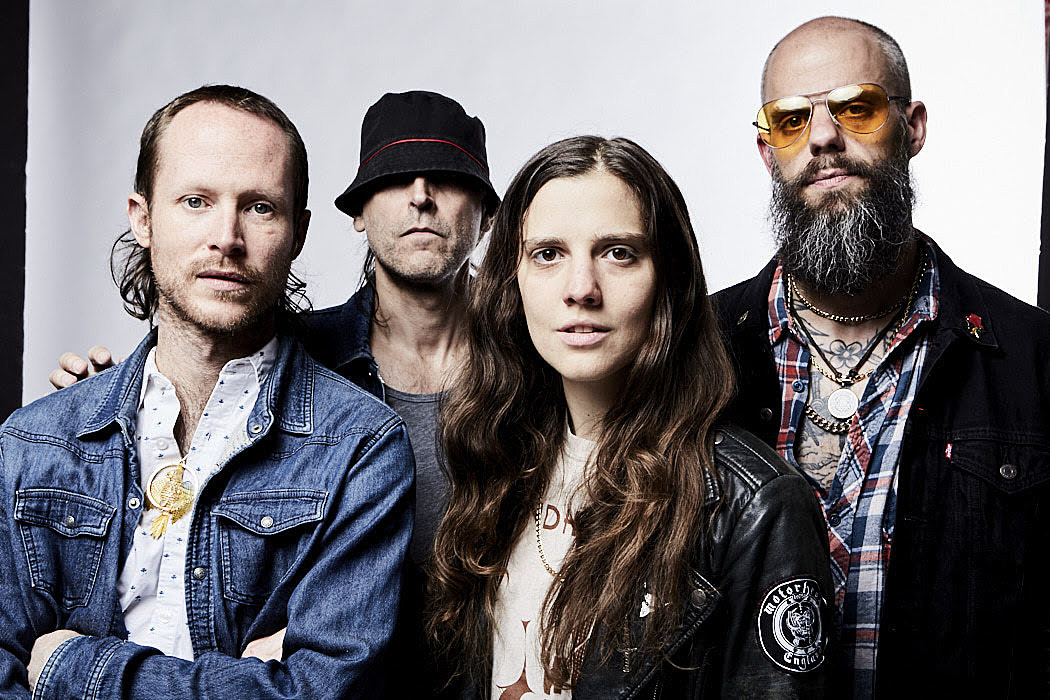
We spoke to John Baizley about Baroness‘ upcoming livestream set for tonight — 9/10 — at 8PM EST. The band headed out to Long Island City’s Culture Lab LIC to perform a start-to-finish rendition of their critically acclaimed Gold & Grey album, which, sadly, the band had yet to perform in front of US audiences due to the onset of COVID-19. We spoke about the implications of the pandemic on Baroness and the music industry as a whole, as well as the concept of live streaming and what it means for bands who constantly tour and what it is like to write music during the year that is 2020.
-Tom Campagna
…
…
I wish everybody was having a different day. Everything has been so, so crazy. I’m certainly pushing good vibes towards any and everybody I kind of come across as my general M.O. right now.
I literally have put it like this: I’ve been saying for about four or five months now that I think my job, in this current situation, is to just keep a positive attitude. That’s it. That’s the work and that’s all of it. If I can do that, then everything else happens in an OK way. If I am not able to maintain that positive attitude, it starts falling by the wayside. But it’s hard work and I’m doing it.
In terms of the show recording, it looks as though you were over here in New York. Was that you recording it today?
We’ve recorded it. I feel like it’s sort of weird, like what it’s like going on right now. But you know, I think we’re in a pretty weird situation right now in that we, Baroness, are in a situation where we’ve decided to enter the live streaming music sphere. That’s something that we never, ever, thought about doing. It’s like, you never know. Up until recently, it was never anything that we ever thought about or really reckoned with. We had, from the moment that we decided we’d do the live thing, which was just about just about a month ago, basically spent the entire past month just dealing with logistics. One of those is the fact that I guess some people are truly live streaming it, meaning like at the moment. What happens if there’s an error, you know, if you’re doing a ticketed event? I don’t know what everybody else’s infrastructure is. But I know that for Baroness, we decided to do this, for a variety of reasons, out of necessity.
Amongst those reasons, we decided to do this with the bare minimum crew. By the minimum, I mean it’s the band and our sound guy. We set up everything and the whole production was installed and operated by the band. It’s a crazy thing. And because we didn’t know how this sort of thing works and all that, yeah, it seems like a responsible choice on our behalf, given that we had a week to prepare for it.Also there was traveling and trying to figure out how to get people tested and yada, yada, yada. That was a total nightmare. Well, we filmed it slightly in advance in case that there was a malfunction or something terrible happened. We are extremely lucky, because we had a number of terrible things happen all at once. We had, like all of our shit blow up on us. And that’s without the typical infrastructure of technicians or venue staff, employees or engineers or, you know, whoever it is.
So what happened?
We had a weird, funny, like, sort of half start and then, you know, the idea is to keep the integrity of the performance as alive as possible while still willfully engaging in broadcasting. We had a couple of camera guys on it who work for the streaming service. Amongst all of us, we really had a handful of totally anticipatable, very normal kinds of gear malfunctions and production stuff. And luckily for us, we did that and recorded everything in one go otherwise. And, yeah, it was crazy. It’s a crazy, crazy thing to do. A very crazy thing to find myself doing.
It’s like you said, you wanted to deliver it as live as possible, but also while running a skeleton crew. So that way, you knew exactly who was involved. And considering how fast some things can happen in this world, you wouldn’t want to have all these extra moving pieces involved in all of that, too, and have to think about that at another time.
Unfortunately, the situation that you just described was very much our situation. Logistically, this is a brand new thing. I spent 20 years on tours essentially dealing with every imaginable type of problem. The reality of throwing a ticketed concert like we did up until recently was very much a situation of problem solving. Each and every day on tour, you’re dealing with thousands of variables, all of which have just as likely a chance of malfunction as they do working correctly. And so, for many, many years, we’ve spent our time trying to preconceive those things, trying to come up with workarounds and all sorts of things and take it to the live music game. And it’s fun because there are so many things you have to consider. And now 2020 kicks in and the whole music industry shuts down and gets pulled out from underneath us right on the eve of what’s going on. And we’re in a situation this month, where, do you know what? We want to start playing music again. We want to start playing this again for our audience. And in the six months after, we’ve been writing music, which is, you know, as you can imagine, a very different mindset than playing music.
So we had to switch gears all at once. And then we, as this whole thing’s been panning out, we realized it’s very different from life. It’s a very different atmosphere. It’s a very tough workflow. It’s a very different concept than playing actual music in front of an audience. So all of these things that we’ve trained ourselves to deal with, all of the, you know, strings breaking out, amps blowing up, microphones falling off, the standard cables not working, just like the typical stuff that’s still there. My head’s still spinning from how different an experience this was. Walking into it, having never done that before, it was nearly impossible to imagine what it would be like, which I think was part of the excitement. I think we’re all kind of amped on doing something. We’re playing music, so psyched to play for our audience. It was a very unique situation that it brought with it and we’re excited. Maybe it just was exciting because it was new and there were so many things that we couldn’t anticipate or expect as to how this very contemporary thing is happening. We’re trying to adapt and evolve into it in real time, which I think is easy again. When the band gets together, because we live in two different cities, we have to test ourselves. We also have to constantly be informing one another on where we’ve been, who we’ve seen and what we’ve been up to in order that we can get together responsibly for peace of mind. To adapt and evolve into that, as well as the idea of playing and performing music now, in this climate, it’s terrifying and there’s so many things about it that feel awkward and difficult. But it’s been a very enriching experience with respect to the fact that it’s new and it feels like the first few years of being a band where everything was unexpected and where, you know, you really couldn’t try to make things work in any specific way because they just were going to happen and it was in the way that they were going to happen. It’s been exciting because there’s all these fresh obstacles to overcome. And I think about bands like Baroness and it works really well in that environment. There’s been so much fluidity in the lineup and the things that have happened to us both on and off stage. And at the same time, it’s kind of new.
Without saying something cliché and talking about the “new normal” and things of that nature, because that’s kind of what’s been said ad nauseum at this point, some of the things that you maybe had done in the past that you’re referring to start to feel new again. You get a different kind of anxiety because even though it’s something you’ve probably done countless times, because of the current obstacles, they start to feel new again. But you start to appreciate maybe what you’ve been able to do and to be able to convey what you’re trying to convey, even if it is in this kind of a different arena, still has to make sense to us to kind of have some enriching qualities about it.
I think that’s something that we all have to reconcile with that in our own way. Personally speaking, I believe I speak on behalf of Baroness: we have to categorize this climate within the music industry and within and across the globe externally. You know, outside we have to work really hard to shine a light on the opportunities that we have here, whether they’re conceptual opportunities or real life opportunities that we’re in. We, like everybody else out there, are in the process of adjusting and making, in some cases small shifts, in some cases paradigm shifts as to how we approach certain things. I will say that the one thing that has been by far and away the most difficult to me to grasp, and one of the things that I haven’t yet, is the fact that we’re playing and we don’t have an audience.
That is a situation that has never existed before. For instance, we rehearse a lot and write in seclusion and that’s not an uncommon feature of a year where there is no pandemic. However, we’ve never played a show. And I have learned from the rehearsals and from the conceptualization of this strange event, that is what I said on stage. What I’ve said in interviews for the past three decades rings more true now than ever, which is that Baroness is a four piece. But our fifth member, and an equal player in a live show, is the audience. And without that, it does feel as though we are missing an essential aspect of what we do. And I think I’d better explain it by saying that we’re a fully capable band to get on stage every night of the week and play the music that we’ve written. Yes, that’s simple. It’s always not easy music to play, but it’s simple enough to get on stage and play music.
I saw you guys at Webster Hall with Pallbearer back in 2016 and that was four years ago now. It was just like you talked about, with the fifth member being in the audience. I remember both bands really bringing it that night. For some of my friends that knew your band, an album like Purple was something different for them and they were really sucked into the whole idea of your live experience. I think you’re totally right. I think you guys definitely invite the audience to be a part of the whole celebration.
Quite simply put, that is the reason the band exists, to perform our music in a large setting. And by and large, I mean with a crowd in attendance. I have always thought the foundation of my musical understanding is predicated on the fact that music is meant to be enjoyed communally. And I think listening on Spotify is fine and watching YouTube is fine, you know, listening to our albums is great. I highly encourage that! But the real experience is the one that we have tailored everything towards and that’s the live experience. And I say this because when we’re performing our music, as I mentioned earlier, it’s relatively simple to get up and play the songs — you know how to play because you wrote the songs. But what we’re looking for and what we’re trying to inspire with each show is that our audience becomes part of that show through their expenditure of energy, through their connection with the meaning behind our songs, through a shared connection with the atmosphere in the room. And it’s one that is very much like an electrical circuit. It works in a very circular way where we transmit energy that travels, you know, from my mouth and into the guitar, drums and these microphones and speakers, the speakers transmit that energy and amplify it. The crowd receives and absorbs that energy. And then, very critically, they retransmit it back to us. That drives us to play in a different way and it adds energy to our music that we would be unable to add otherwise. When that happens, that gets broadcast again and it moves in a certain way and it becomes a feedback loop. And that’s why every once in a while you’re in a show by an incredible band and you’re feeling it downstream and you’re driving that, and that becomes the trend since four or five musicians are doing that on stage or with the thousands of people in the audience and doing what you heard on records becomes something bigger and bigger and better.
Now consider the standards of the Covid-19 universe, in the Covid-19 earth: we’re unable to access that audience in the same way. I think for a band that’s spent so much of their time trying to understand the challenges of having that audience and trying to enrich the experience that the audience has, by virtue of that, they’re trying to enrich the experience that we have, the connection that we have with our own music. I think that we can feel somewhat untethered or at the very least without a net beneath us because we’re so accustomed to that member of the band and that extra variable that drives our performance. The idea of these streaming events, the idea that on the whole, the music industry, it’s skewing towards these isolated events that are ticketed and broadcast and watched by, I am struggling currently to find and to imagine the net result of all this in a positive way. I hope that what we’re working towards is that moment when it’s a civically responsible thing for us to get on stage in front of people — it’s, you know, morally and ethically responsible for us as a band to ask people to get admission to a physical location that we can show up to where we can get back into the normal routine with the normal obstacles and play music the way that we intended for it to be played. In the interim, I’m wrestling to balance out whether or not what we’re doing now is meant to stand in for that or if it’s meant to be a way station on the road towards playing rock music again, or if this is for the time being, the way music is performed.
And so, I think for a band that’s been around for a handful of years and released as many records as we have, how much do we have to meet the needs of this new environment? Obviously the answer is not at all. You know, I hear you like what we like to do, music the way we like. We got into it for a specific reason and I’m hoping that, you know, through this event — and hopefully very few others like it, but very likely until then there will be more of this — we can learn something substantial. Then, of course, we can learn something substantive about this format and how we can use it to better express ourselves.
It’s the responsibility of you as a band and also other people, like whether you would feel comfortable putting people into harm’s way. And the idea certainly would be to not do that. But that’s a mentality that’s kind of developed out of this whole situation that’s completely unique unto itself.
Of course. I think a lot of it was just a given because the industry and the venues and the environment that music is played in have also taken us into consideration. There are liability issues that the clubs deal with, the contract I mean, and now it’s a whole other world. For us as a band, we assume venue safety and the security, that our audience is going to be kind and considerate and compassionate. But now there is a heightened level of responsibility that not only we as a band have to contend with, but our audience to contend with as well. I think, you know, we look at it like the Smash Mouth and Sturgis and all this is just a complete nightmare, and I hope that it doesn’t impact the greater listening public at large in such a way that they think that that’s indicative of all bands because in fact, it is not. And that of course, we immediately saw a real threat that as a band we are potentially like these super spreaders because we’re in a different city every day. We live in a self-contained 45 foot steel tube vessel where if one of us gets it, if the band or crew get sick, everybody does. And then we’re potentially going to miss it every day, in fact. Right. It’s very obviously irresponsible.
I still think there’s a way to do it — you know, the parking lot shows, people want to feel things together, and the closer together, it’s seemingly the more fully you experience that concert event. So I think it would even be irresponsible for us to say, let’s do something in the nature of the six feet apart, because our band wants to bring people together. It flies in the face of responsibility. But also, you know, if it passes the message, it was the basis of our message and our business and our philosophy as performers. So it’s like we have a huge responsibility right now not to create an environment in any way, shape, or form that puts anybody at risk. I think all bands certainly are unique in doing this, and I hope everybody is getting better amongst musicians — as a result, all of my friends and I are just getting closer and closer to this desperate need to tour and acting on it. We’re adventure addicts, we have been on an adventure for two decades. And the adventure ended in, you know, the early portion of 2020. I just wanted to start again, but I wanted to start the right way. But it comes with its daily/hourly frustrations and anxieties and fears for ourselves, and more importantly how we can act responsibly in a specific manner and meet the creative goals and needs of the band and the goals and needs of our audience. How that’s all achieved is somewhat mysterious to me at this moment. It just seems like it takes a whole lot of engineering and logistics to get anything together. I’m anxious to see how that pans out this week as we continue through this.
With all the current negatives, I think there’s going to be hopefully some net positives to come out of this. And certainly nobody would ever want to have to go through all this. But if it were to have some kind of an end game or some lesson to be learned out of all of this, I certainly would hope that’s kind of what we’re pushing towards. You can make your contribution, however large or small it is with some of these streaming events, it’s going to positively impact somebody. It’s good to see other people, even if it’s through you know, Zoom calls, Microsoft Teams, whatever it is, some level of familiarity to see that the people that they care about are okay. And I think you guys doing an event like this would be, at whatever level it may be, some indication that you guys are still doing okay. And to put yourself out there and considering what people are dealing with and the band is still going… maybe I can, you know, keep going, too.
That’s such a critical part of Baroness, too, to have a meaningful connection with our listeners beyond the superficial. But we’ve, as many people know, spent a great portion of our career trying to maintain more than the average engagement between artist and audience. We’ve really taken great strides over the course of our career to break down the perceived barrier that tends to elevate and put the band on a pedestal and so forth. I mean, that’s the real physical implication. But what we’ve done so frequently is we walk around the audience after shows and shake hands and hug everybody, things that are not possible now, and meet people outside and have conversations. I think for us now, part of the challenge is to figure out a way to approximate that or a new way to engage with our audience that has those similar aspects, while at the same time respecting what are very real and very obvious restrictions and boundaries between us.
Initially when the pandemic came down, we shut down. Our attitude was, “Let’s just keep our heads down. We don’t need to be posting. We don’t need to be selling. We don’t need to be doing the normal stuff because we’re not on an album cycle anymore and it’s not going to happen. So, let’s really dedicate ourselves to creating and producing something new.” I’ll say that 2020 from a purely musical standpoint has been one of the most, if not the absolute most fruitful year of our existence. It’s actually been kind of great because we’ve had to take this worldwide situation, and we’ve had to absorb it and turn it into something that we consider creative and uplifting, and try to be positive. It seemed like a really easy and good and genuine way to turn the negative into a positive in a minor way, in a way that we can contribute. And as things went on, seeing all these timelines kind of extend themselves, at first it was we’ll kick everything down the road six months and then, you know, we’ll take everything down the road, 12 months. That sort of felt like a joke at the time. And then all of a sudden you’re talking in terms of 18 months, a year and a half. We’ll push all the shows and kick off festivals down a year and see what happens and put a hold on all these things, but let’s manage our expectations. And as soon as that happened, it became clear to us and we found that we can’t keep our head down that long.
This week and this month is really our first foray back into facing and addressing the public and our audience. Hopefully the inspiration works both ways, because we work really well when we’ve got an audience. I think this feels as timely as it possibly could. Where once I was extremely resistant to the idea of doing this thing, now it’s a definite reality. And I think we’re already sort of thinking in terms of the future if we have to do this again, because the timeline on this is too long, like we’re already brainstorming new, more adventurous things to do. For now, you’re talking about the creativity in everything before we get to anything like on the new side.
What are some songs that you were looking forward to actually playing to this audience that maybe you haven’t really had a chance to do yet?
In the US at least, we have not supported this record. We toured in 2019 and that was prior to that being released, and then immediately after the record was released. We did the opening night show, a few little things here and there. But then we were in Europe for like nearly three months, and so we were supporting in a very literal sense of the word. We’ve never really gotten an adequate stage or environment to showcase any of our songs, so this will have to do for the US touring. It was just this year, and for the European shows that were missed this year and for the Australian and Japanese and all the international shows that we’re meant to play, we were really looking forward to the stuff that we didn’t play on the tour. I think that we had maybe three or four songs in that Deafheaven tour, so it was a huge, huge album left for us to work out, you know, work out the kinks onstage and figure out the live versions of them. Unfortunately, that rug was pulled out from underneath us.
I think Gina suggested that we do the whole record. And it was like, yeah, of course, it’s a hugely ambitious thing because it is some of the most dense and some of the most complex. I think it’s one of the cooler things, playing an entire album live, but we’ve never been able to pull it off. We’ve never written or recorded a record that we’ve been able to play all the songs off of. There’s typically at least one or two songs that are so concocted and organized by the studio that it would be, you know, sort of physically impossible as a four piece to perform. Although with Gold & Grey, it is a wonderfully dense and ridiculously complicated record, it’s also performable. And so what we did was after five or six months of not playing any of this stuff, because all we were doing was writing, we spent a week just calling ourselves in marathon rehearsal sessions, trying to work out how to play material that has an extremely high dynamic range. That’s everything from the most physically demanding and intense sort of playing that I’m aware of in our catalog next to some of the most tender, gentle and soft stuff that we’ve ever done, trying to learn how to use that whole dynamic range in a very short period of time. The idea was actually a hugely ambitious challenge.
I think because of it, it became something that felt like being in the band normally again today, because I was always pushing for these painfully difficult concepts that we engage in and you have been in a relative, musically speaking, comfort of the writing cycle for so long. And then to just jump straight back into a performance that’s got pressure amid all the pressures that come along with that, I think it was really exciting, it’s going to be more like a white knuckle experience the entire time. It feels metaphorically like we’re on a high dive and we just jumped onto the springboard and it’s down: whatever happens, I know we’re about to go flying up in the air; who knows where we land? It’s going to be a total mystery to me, but I hope we get to do a whole bunch of tricks before we do that. I don’t want the necessities that it brings to the forefront to inexorably change what this band is and to fundamentally shift what we are and why we do it and how to do it. I want to think that like every other situation we’ve been faced with, we can make the situation work for the best as opposed to making the band work inside the context of the situation, which sounds similar.
I listened to Gold & Grey a couple of times recently and I felt like this time of year… summer is winding down and the fall is coming. I kind of feel like it meets that transition and in a really kind of a natural way. And it felt like, almost like the perfect time of year to maybe put on this show.
That’s an extremely articulate way of saying it, because I’ve always felt that the cycle of touring in a band is really hinged around the seasonal shifts and fall is a fantastic time to tour. The weather’s great, you’ve just come off the summer. Summer is usually festivals the whole time, and it’s usually in Europe. And it all is, technically speaking, the time when you start moving around a lot, you know, it’s normally when the big worldwide tours happen and the full US tours happen that take months to accomplish, it puts you in every different type of market in the US. For me, personally speaking, it was my favorite season because it always brings with it all these changes. It sort of makes me feel like travel makes me feel — like going on an adventure. It’s been like playing music in front of people. And so to be able to listen to that now, I get what you said and I can consume more time because this is like starting.
I’m just thinking about how you got to turn these negative experiences and these life altering experiences into some level of positivity. This is your way of doing that. You also talked about the current state of the band, you’re not really on the album cycle anymore, too. But it’s still relevant, for US audiences, since you added Gina to the mix. What is something that she brings to the table for the band? Something fresh and new? What kind of presence does she afford the band?
I have to admit, she’s been in the band for such a period of time now that she doesn’t feel like a new member anymore. It can be an interesting thing to note that where we have undergone a lineup change, it was always difficult, difficult for everybody involved. We’re in the middle of something big and we feel like this is an opportunity. We respect and always have the highest amount of respect for anybody who’s been in this band. We’re stepping up now. She has more of a personality, to say, that’s sort of a prerequisite for this band, but she’s also an incredibly talented musician. Fantastic voice. Just a pleasure to play music with. To have been in a band for so long and to have gone through so many lineup changes and to have been able to say this with each new member, that they genuinely are inspiring musicians and individual people. You know what? I hope to have lifelong relationships with people, people I love, people that I have real chemistry with.
The perfect chemistry exists every single time you invite somebody to enter your group. And luckily for us, that has been the case and I think it’s hard for me to understate how amazing that is while at the same time it happened so quickly with so much enthusiasm on everybody’s part. It was almost hard to tell when anything happened — she’s just such a strong player and such a strong performer, and she has a vitality that you always hope for. So she’s coming into a band with three other members who share that as well. And everybody’s got this high level, sort of overwhelming intelligence sometimes. It’s just great to see things continually moving upwards from a creative standpoint, from a performance standpoint and I still feel as impassioned and invigorated through Baroness as I ever did. When you first start, with that kind of like doe-eyed enthusiasm that you have when you’re a teenager and start a band, you don’t have to lose that. I think that’s the lesson that’s particularly for me, is I never thought I would have to sacrifice that. As I got older, I thought that that would be something that faded with time, like so many things. But in fact, it has been almost like the only constant in this band. It’s our music. I think it’s really hard to explain just how special that is and how important individuals who comprise that system for me are.
Nick, Sebastian, and Gina, what they bring into this band is priceless because it’s inspiration and it’s motivation. And it’s all those things that are sort of hard to calculate, hard to quantify. But you certainly don’t know.
Yeah. I mean, certainly with everything with the band, with all the members you’re certainly not going to keep going if you don’t feel like you have some kind of a unified front in terms of how you approach things, how you want to play, and what you want to write.
Yeah, I mean, it just wouldn’t make sense. This is pointless. There’s a pointless profession to be in if you don’t really love it if you can’t find the positive qualities in it all. And, I mean, there’s a lot of good stuff as well as the bad stuff. And if anything, it’s easy to say how often is that? We just travel around with music in front of people. We meet new people trying to feed, swim on exotic beaches, climb mountains, meet the amazing people of the day. That’s so great. But it takes time. It takes effort. It carries with it a lot of frustration and that carries with it the zero financial security or regularity. When a pandemic hits your home, prevention shuts down, for instance, and you have to have this attitude that you can overcome any and all of that all the time. That’s sort of the common denominator, especially now with everybody that there’s always something to do, and there’s always a new song to write. There’s always a new set of lyrics that are going to be important to create. There’s always new artwork to make. There’s always another one. There’s always a new city that you haven’t been to yet that you can’t wait to go to. And that’s the case with us. And yeah, if our line up was slightly different in some situations, or had been different by one or two aspects, I don’t know that situation would still be the case. But it is. I mean, the thing is.. that’s a pretty heavy statement, I think, for anybody in my position to say countless times into a microphone at the end of the set, hey, you know, thank you. I want to thank you guys, blah, blah, blah. We still love this. We’re still doing this all over again. And, you know, it becomes kind of like a ubiquitous platitude. I genuinely see all of this potentially amazing stuff happening, and I can’t wait for it to happen, and it surprises me that I can still say that.
We’re still here and will hopefully come out of this either unscathed or relatively unscathed. I know some other people are not. And it’s hard to think about it. And I’m not trying to make it like it certainly isn’t about me. And I know for you it certainly isn’t about you.
It’s about the greater good, the collective. The collective that we’re dealing with, not even just in this country. We’re dealing with a global situation, one like we’ve never dealt with before. No, I’m just saying that there’s still the fact that we could still try and have that positive outlook and hope for good to transpire. But everybody has their own circumstances that some people really don’t, or really can’t, see at this point. In its simplest form, I think that we can offer a wonderfully uplifting escape from the doldrums in this situation. And I don’t know if I’m looking for some change. I’m looking for some escape, looking for something to break out of, you know, the daily cycle of abuse and horror and tragedy and awful leadership as well. But I’m anxious to see if we can turn that into something that informs on music and in a meaningful, powerful way without capitalizing on it and without it souring up.
You know us as individuals… I think that we need inspiration, motivation too in times like this, and I know very much when I was a kid, I relied on music to guide me through some of these times because it’s a very, very simple and effective way out of dealing with your emotions sometimes.
On the art side, have you been able to do any of your work on some things during all of this?
The thing that’s come to the forefront recently is that I think initially, when the pandemic started, isolation was necessary, I kind of shut down creatively for it. And it was like real work for me to figure out how to get my stuff drawing. It seemed like music was a little bit easier to accept. I think just because I have had a group of friends that I play with and they’re making music with me, we’re sharing files. And I think that it became really easy for me to get the artwork stuff. And so for the past month or so, I’ve been traveling. I’ve just got back into it. I think I think you and everybody else hopefully will be seeing a whole lot of new stuff that’s coming out, because once I realized that there was a hole in my life, that a void that existed because I wasn’t engaging that particular side of my creativity, I sought to fill that void as quickly as possible. And it’s really because I’m extremely excited about what I’m working on right now, because the amount of time that we spend, we’ve been forced into or given has given me the opportunity to push myself. So I’m very excited about what is likely going to happen in 2021. I’ve got all this pent up anxiety, anger, and confusion. I’ve got all that stuff pent up and that’s the food that feeds my creativity. So it’s like it was nothing for a month or two there and then everything all at once and it was really, really busy. I think especially the fact that stuff I was super excited about what we’re working on right now, which might not come out essentially for a while, but we’re on to something extremely exciting.
The thing is, like, this is all we’re doing right now. In a way, fortunately or unfortunately, we have no other distractions. So we’ve got a really big idea that we’re working on. And I don’t see why but I actually think we’re working faster, and it’s like a higher level of quality and like a new chemical that we’re working with here and writing music. And I think I think actually we’re going to be finished this year between our albums. I think we just wrote a fuck ton of music.
Absolutely. Like you said, you’d never maybe had the ability to write for long stretches of time like this because other things come up during this, that even though you probably may be able to write some things on tour, but to focus writing like this with no touring, you know, it’s not something that I’m sure happens very often. I can sense that you’re excited about this record. I’m sure people are really excited to check out the live streaming events. Well, hey, listen, is there anything else, you know, you wanted to say to your fans?
I think that before we got the streaming idea or something, I was like… I’ll say I’ll admit I was somewhat resistant to it. And through the process of doing this, we have kicked up so much dust and we’ve forced ourselves to learn things that we want to play. The preparation for, and the act of this event has given us more light, in a year where it’s really easy to sort of fall into this general malaise. It’s put fire directly beneath our asses. And I think that’s a great thing for us.
…
Purchase tickets for the Gold & Grey live stream here.
Support Invisible Oranges on Patreon and check out our merch.
]]>
Learning there was going to be a new Valkyrie album was certainly a surprise to me. While we were pretty much on track for a new one based on historical trends, I have to admit that 2015’s Shadows passed me by originally, so the possibility wasn’t on my radar — nothing to do with its quality, just my inattentiveness. For those in the know, however, new music from these Virginians is something worthy of reverence — to be spoken of in a hushed voice, quietly brimming with excitement. Continuing the trend that Shadows set, their new album Fear further elevates the raw proto-metal-meets-heavy-rock feeling of the band’s early releases. The band’s talent and vision channel that emotion into hard-hitting sagas that at times feel almost too picturesque to be as heavy as they actually are.
…
…
2008’s Man of Two Visions was the perfect album for 2010 me, when I found it — fittingly enough for the album name, it combined retro stoner metal with proto-metal leanings for a dual impact, occasionally savagely raw and and just as often beautifully poignant. It captured my imagination, and the bizarre album art and concept made it an easy revisit through the years. Shadows, although not as indelible in my mind, was a clear next step for the band — a step forward emotionally, feeling more mature and fully realized. Of course, that also came with a slightly more polished approach, evidenced by the album art, but it was still very much Valkyrie: gentle heaviness with an undercurrent of raw energy.
Fear finds Valkyrie in full mastery of both previous albums’ strong points, delivering a mix of catchy hooks and progressive-minded guitar harmonies. Moving further away from any explicit “stoner” feel, the big riffs here are more highlights than cornerstones — a variety of guitar textures are interwoven into songs besides just big chunky stomps. I mean, those are still here — the opening track “Feeling So Low” makes that clear. But on “Loveblind”, the heavy-hitting riff up front soon transitions into airy guitar leads that contrast against the Sabbathian bass flurries energetically driving the core of the song. “The Choice,” featuring one of my personal favorite Valkyrie riffs ever, doesn’t lean on it for too long, building up the pensive atmosphere of the track without losing the head-nodding appeal.
While cetainly drawing from their past works, Fear has its own sound that can’t be ascribed entirely to those. Southern rock’s poignant gloom finds an extremely suitable host in Fear, such as in the hook of “Fear and Sacrifice,” where the intricate melody feels right at home against the heavier rhythm and bass elements. The uncommonly gripping dual vocals of brothers Pete and Jake Adams, which have always been a mainstay of the band’s appeal, are given headroom like never before to bring the darkened corners of the songs into the foreground.
Underneath the vocals, the twin guitar work of the brothers is simply stuffed with solos, harmonies and aspirational lead work. Often, that can be a detractor for bands that err too heavily on the “jam” side, but every note on Fear is played with soulful intention. Interestingly, the guitars aren’t usually too heavy on their own — most of the impact here comes from the impeccably-calibrated bass work and vigorous percussion. The guitars add sparkling crunch to the rhythm section’s critical mass, creating the “gentle heaviness” I mentioned before, only with a clarity and sense of immersion that outmatches any of the band’s previous albums.
What cements the quality of the album is the band’s chops — the lengthy rockers are filled out with dazzling displays of skill from every member. There’s a few lengthy drum fills scattered across the album, placed with an artisan’s sparing hand, and every one of these rare treats is an adrenaline-injecting jolt. I know that putting an entire drum solo track on an album is generally considered a Career Limiting Move, but I would have been okay with it here, just this once.
To be honest, Man of Two Visions is always going to have a place in my heart that Fear can’t usurp — but that’s because it happened to come into my life at a time where it was exactly what I wanted to hear, and nostalgia has eternally enshrined it. Fear, however, is absolutely the best this band has ever sounded, and feels like the truest possible Valkyrie sound yet: the way that the innumerable creamy guitar leads smash up against the ingenious bass work and squarely-in-the-pocket drums simply can’t be matched. As you find yourself lost in the lengthy, minutes-spanning adventures that comprise so much of the album, there’s always another killer riff around the corner ready to bring your head back down from the clouds. For newcomers to the band and longtime fans alike, I suspect that Fear is coming into your life when it’s also exactly what you want to hear.
…
Fear released July 24th via Relapse Records.
Support Invisible Oranges on Patreon and check out our merch.
]]>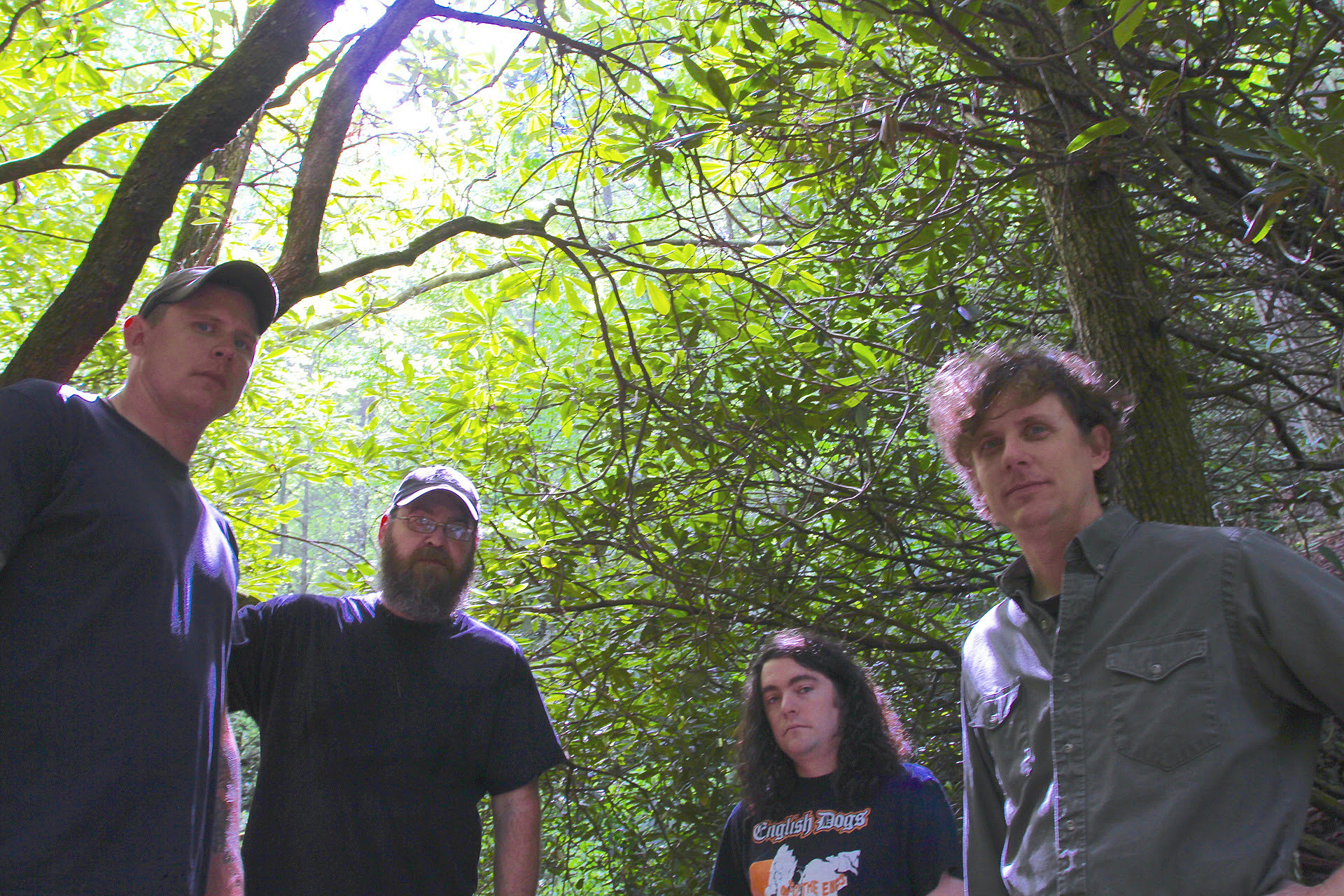
…
Valkyrie, the Virginia heavy rock band led by former Baroness member Pete Adams and his brother Jake, have announced their first album in five years and first since Pete left Baroness. Fear comes out July 24th via Relapse, and first single “Feeling So Low” finds the Adams’ brothers dual riffing sounding as badass as ever. Listen and check out the artwork and tracklist below.
…
…
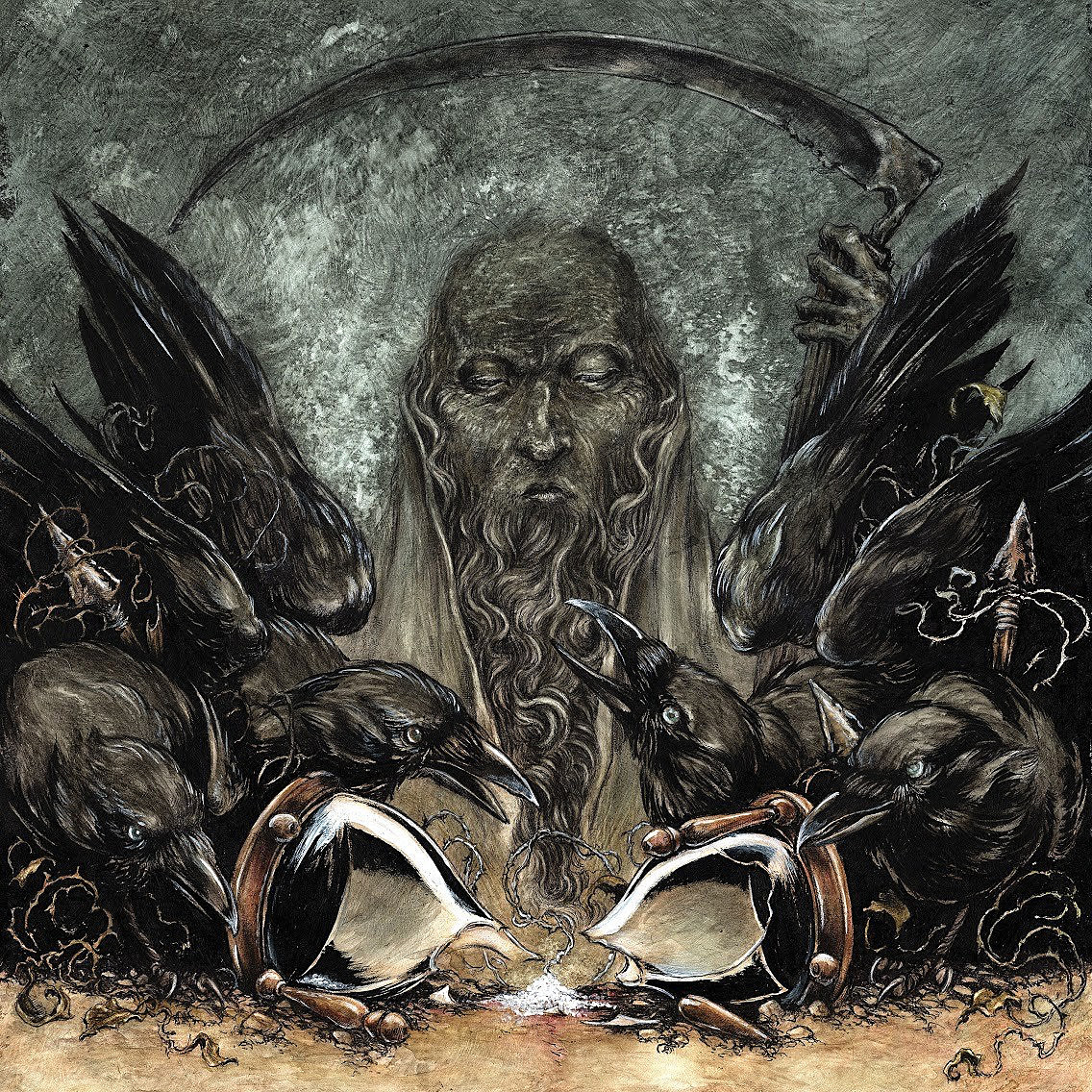
…
Tracklist
1. Feeling so Low
2. Afraid to Live
3. Loveblind
4. The Choice
5. Fear and Sacrifice
6. Brings you Down
7. Evil Eye
8. Exasperator
…
Support Invisible Oranges on Patreon and check out our merch.
…
]]>…
As I mentioned in my year-end list for 2019, these types of lists cause me an incredible amount of anxiety. For the sake of space and time, I won’t get into any of the mechanical reasons why these lists freak me out; as much as transparency for these issues is a good thing, I think it would be tedious to make you sit through reading all of that again when the link would suffice. However, those yearly issues don’t just compound and multiply for me when discussing the past decade; rather, what causes so much angst and heartache and, quite literally, more than one panic attack for me is precisely the span of time this decade list is meant to cover, plus the things it forces me to confront again. My birthday is in December, so while I technically have almost a whole month of post-birthday time every year, it’s better to think of each calendar year as more or less precisely matching an age year for me. In this case, 2010 brought about my 21st birthday and 2019 will see me turning 31 for a brief bit before the 2020s begin. The truth is, my twenties were the worst period of my life. I’ve discussed some of these issues before, but it was the period that the pet that saw me through my childhood home abuse passed away, the period where my first long-term relationship dissolved in my hands as I became, frankly, a shittier and shittier person, the period where my mind broke apart and sent me to mental health wards and suicide prevention therapy sessions and rigorous rounds of additional therapy. It was a decade in which I had a suicide attempt sandwhiched between two massive mental breakdowns, both of which saw me shave my entire head while drunk and devolve into deeply antisocial behavior. It was a decade in which my father died and a number of people I’ve known since I was child were taken by fentanyl and shotguns in closets. It was a decade in which I developed and overcame eating disorders and substance abuse. (Sober almost two years now). Music has always been a crutch for me. In good times, this is a good thing: it achieves an alchemical dance with the events of my life, pulls out colors and shapes and crude contours I otherwise might never have seen. In bad times, this can be a bad thing, causing me to fixate or spiral deep inside of a feeling or experience instead of climbing out and beyond it. There are, of course, things inside of traumatic experiences that sometimes we are better served diving in to retrieve and carry with us — ugly but necessary things. However, not all traumas contain them, and the psychic risk of these bathyspheric pelagial descents are steep every time. I’m on the spectrum and deal with bipolar and psychotic episodes, so when I saw music is my psychic weapon and shield, this metaphor takes on a sometimes understandably goofy level of literalness. There were nights of lying in bed, weapons removed, tossing and turning awake and out of my mind, record blaring at max volume as some singular silver tether both into my heart and out of my body, in case either got too dangerous. So, summarizing the past decade of music in which music was welded to me both with and against me during times of tremendous pain and turmoil is tricky. I perhaps have access to “greatest” or “best,” but I’m not interested in that because, to be frank, that’s not what music was for me in that stretch. Everyone’s twenties are hard; it’s the first decade we are thrust fully into the adult world only to find that we and all of our peers are so poorly prepared for the roughness of the world without rails or guides and where we can easily find ourselves terrifyingly alone even when surrounded by people even if only because we’re all so new and unpracticed at compassionate and just adulthood. I suppose, actually, it is a kind of “best,” but it’s one that isn’t concerned necessarily about the technicalities of songwriting or performance but instead emotional utility. These are the records that were my broken shield and my rusted weapon in the deathless decade of my plague years. If that’s perhaps a bit too dramatic for you, they also all happen to be damn good. Would that this list could go on forever, but alas, I am only allowed so many I can name. I’ve attempted to avoid duplicates per band; generally speaking, if I like one record by a band on this list, I almost certainly like others too, but in the interest of spreading as much love as possible instead selected the primary one I go to or resonate with. Certain bands who won’t be named, had they been more mindful of their behavior, would have found themselves easily on this list but, alas, they elected not to. As before, the order doesn’t necessarily specifically matter, and if asked a month earlier or six months from now, the entire list and its order might be different. But, for today, it is true.…
Honorable Mentions
Converge – All We Love We Leave Behind (Epitaph Records, USA) Oranssi Pazuzu – Värähtelijä (20 Buck Spin, Finland) Pallbearer – Sorrow and Extinction (Profound Lore, USA) Power Trip – Nightmare Logic (Southern Lord Records, USA) Godflesh – A World Lit Only by Fire (Avalanche, UK) Sumac – Love in Shadow (Thrill Jockey, USA) Baroness – Purple (Abraxan Hymns, USA) Bell Witch – Four Phantoms (Profound Lore, USA) Woods of Ypres – Woods 5: Grey Skies and Electric Lights (Earache, Canada) The Great Old Ones – Tekeli-i (Les Acteurs de l’Ombre Productions, France)…
Once, while I was listening to this album in my car, the opening of “Baby Blue” came on and I suddenly found myself humming, then moaning, then singing, then crying. It was a spontaneous thing, one I’m glad I was alone for. Not because I was embarrassed, not really, but more because being alone I could give myself over to the experience more fully without fear of the jokes that would come after. For as much talk about surface-level details of this group and the perpetual “will they, won’t they” regarding their intense agnosticism toward having any one kind of sound, they produce some of the most savagely beautiful and emotionally heartrending pieces of music in metal right now. Add to this that George Clarke’s lyrics are, well, good (check out his books too) — like, actually good and not just good with the music. “The Pecan Tree” from Sunbather was a hint at what he could do with his pen, but the entirety of New Bermuda is sheets of tremendous poetry set to even better music. “A multiverse of fuschia and violet / surrenders to blackness.”
I won’t attempt to justify why I prefer Enslaved’s later material to their earlier material (I own both, by the way) — I’m as much into progressive rock as I am heavy metal, so this later chunk of their career satisfies me the most fully of their work. Of that phase, this is my favorite, producing endlessly compelling longform epics that allow me to safely indulge in pagan and mystical fantasies of intense meditation upon the imagistic symbols of spirit and earth. Metal, like prog, is about theater and emotional investment, giving yourself over, and despite having little in my life to connect me to their sincere neo-pagan ideologies, this seizes up my heart. I can almost experience visions of Odin. Exceptionally beautiful.
This is the first of several records I have written about in my death metal column, so it should be no surprise to see it here after the rapturous words I had for it there. Gojira is one part groove metal and one part Morbid Angel, producing lush and complex prog suites delivered with the relentlessness of a group like Pantera. From Mars to Sirius is clearly their overall best, but was released outside of this decade; Magma was there with me through the death of a very close family friend and I know those songs better, but that album still misses a certain something. Meanwhile, the first third of L’Enfant Sauvage makes me feel the way I did when I first heard them, playing them through tinny laptop speakers while clutching my bed, riding out the paraesthesia and intense nausea of the comedowns from antidepressants as my insurance screwed me again.
I’m not going to waste time perseverating over whether Ghost is heavy enough or whatever. This tracklist is flawless, finally perfectly capturing not just the intense liberatory Lucifer-worship of the group but also the deep primal joy that arises from Satan as they envision him. It feels very Nietzschean and Dionysian, with songs like “Spirit” and “Cirice” outlining their image of the devil as the artist and poet’s Satan, the figure with laughingly coaxes us to our imaginative limit and then thrusts us full of faith into the darkness, sure that we will fly in the abyss. Cap it off with songs like “He Is” and “Absolution,” not to mention the impeccable instrumentals, and you have a nearly perfect record. Their latest is a bit better, but this one is more personal to me.
Carcass’ likewise stellar comeback from the same year could be swapped here and the message would be the same. Each band came back after a length hiatus of over a decade (more in the case of Carcass) and nevertheless produced not just a great album but their greatest. Gorguts got the slight lead due to functionally representing Colin Marston and Kevin Hufnagel, who each more or less have impeccable CVs otherwise unrepresented here. It was released in the year of Sunbather, an incredible album by an incredible band, but this one deserved more love. It’s one of the greatest metal records of all time.
I would have loved this album even if it weren’t for my personal connection to it. But when my paternal grandfather died, my last grandparent and the father to my then-deceased father, when I was overcome with the sudden tremendous burden of reckoning with my family history rather than pretending it simply didn’t exist, this happened to be the record I was obsessed with at the time. The long walk I took through the grounds of the old house Wyoming tucked deep in Spartanburg, South Carolina still lingers in my mind, strangulated old wood leafless and barren storming around me to the waves of downtuned guitars. “Marrow” might be the greatest song of the decade.
I’ve shared this anecdote elsewhere, but I will share it here in briefer form. In 2011, off the back of my suicide attempt and what felt at the time like the total collapse of my life, I hunkered down and, in a single playthrough of this record, produced what would become my first published piece of fiction. This marked a turning point for me on a personal level. I don’t know if I would still be here without that moment. It’s a perfect album, vast and imagistic, the perfect hybrid of post-metal and death metal. It also marked the beginning of a still-ongoing hot streak for the group.
I’ve loved Deftones my entire life, being lucky enough to be paying attention to rock radio as a kid when Adrenaline and Around the Fur dropped. I fell out of following them just before the release of Saturday Night Wrist, a record I now adore. It was Kat Katz, a friend I became close to around the time of my father’s passing, who recommended their previous record Diamond Eyes, which is destined to be a classic, which hipped me to the band’s work again. It was this one though that burned itself deepest into my psyche, was my armor through the darkness of those early years of psychosis and terror. I named it my favorite album of the year when it came out, and even now the manner in which it seamlessly flows more like a 50-minute suite of dream pop, doom metal, shoegaze, and Chino’s perfect voice feels more akin to a metal Kate Bush than anything else. Their very best album.
I prefer Ihsahn’s solo work to his work with Emperor, which happened to be the first black metal band I ever loved. His solo material sounds to me like what he was always trying to do in Emperor but, money and technology being what they were, simply couldn’t. Eremita is the peak of his work, at once an astute set of insights regarding the poeticism of Nietzsche’s philosophy and an emotionally hefty prog metal record. I was in a very bad place when this was released and had long associated Ihsahn’s previous solo records with similar power of buoyancy in darkness, a cackling and demonic glee and sense of self-justification and self-love that defied the goofier and at times downright racist inclinations of some black metal. My relationship to this one is intensely personal, a record that helped me learn to love myself and by that love to heal myself.
I wrote about this release for my death metal column. What I said in that column is, despite its length, a short version of what I see and experience through this record. It would sound cartoonish to describe it as an ecstatic spiritual experience, but for me it very much is, feeling like a fevered bathyspheric plunge into the lysergic depths of dream and absinthe. If magick is a manner of thinking and perceiving the world and the pitched intensity of art is its best vessel, then this is the magick rite to rule them all for me. I feel effervescent afterward, complete, whole, invigorated, powerful. It fills me with a primal sense of joy, not sadness or anger or even vengeance, something we sometimes neglect to mention extreme metal can do.
The marriage of progressive rock and extreme metal on The Children of the NIght, to my ears, perfect, and the resulting record is not just my favorite of the decade hands-down but also one of my favorite and most treasured albums of all time. You wonder sometimes as a writer, or even just as a person, a wondering compounded for those of us on the autism spectrum or mentally ill or otherwise carrying disabilities visible and invisible, whether anyone in the world beyond your body understands you. Something like this record comes along, which knows me inside and out, and I feel incredible peace.
…
Metal had some prevalent trends in the 2010s (“blackgaze” being the first one that comes to mind), but right now, I think what I’ll remember most about this decade of metal is how it wasn’t defined by a few key subgenres or a few key bands. Here at Invisible Oranges, individual writers are making their own lists, and though there is some crossover between the lists, it’s not surprising how different they all are. We all lived through the same decade, but lived it so differently and formed connections with such vastly different records. The records on my list tend to be the ones that flirt with punk, psychedelia, post-rock, and straight-up rock — with a few exceptions — and some of these records came from long-running legends while others came from newer bands whose careers didn’t really take off until this decade. Because we had to narrow this down to 20 picks and there were way more than 20 bands who released future classics this decade, I kept my list to one album per band to allow for the most amount of variety possible. In some cases, it was a no-brainer which album was going to make it, but some of these bands might’ve had three albums on my list if we went to 50. That all said, read on for my 20 favorite metal albums of the 2010s, with commentary on picks ten to one. I hope this list is of some value to you, and if it’s not, feel free to rip it apart in the comments. Rock on, and see y’all in 2020.…
Honorable Mentions
Napalm Death – Apex Predator – Easy Meat (Century Media, United Kingdom) Electric Wizard – Black Masses (Rise Above, United Kingdom) Nux Vomica – Nux Vomica (Relapse, United States) SubRosa – For This We Fought the Battle of Ages (Profound Lore, United States) Neurosis – Honor Found In Decay (Neurot, United States) Oathbreaker – Rheia (Deathwish, Belgium) Martyrdöd – Elddop (Southern Lord, Sweden) Torche – Harmonicraft (Volcom, United States) Thou – Magus (Sacred Bones, United States) Windhand – Eternal Return (Relapse, United States)…
Way back in 2017 when Nightmare Logic came out, I used to say it solidified them as my favorite modern thrash band. Even then, I was underselling it. Power Trip are one of the best thrash bands, period. They regularly play shows with the bands who defined this genre in the 1980s, and they hold their own next to all of them. It’s important to celebrate originality and the act of breaking ground, but to quote Drake, “It ain’t about who did it first, it’s about who did it right,” and Power Trip did it very, very right. Nightmare Logic gives you all the thrills that you got from the best of 1980s thrash and crossover thrash, but it continues to feel like a new album. They take obvious influences from 30+ year old albums, but while lots of modern thrash bands simply pay homage to those albums, Power Trip breathe new life into the genre. At this point, they’ve been in the game for over ten years and they have their own festival. They’re tastemakers, signifiers of cool, and they don’t seem like they’re going anywhere any time soon. I won’t be surprised if they’ve got an even better album in them, but for now, Nightmare Logic is already going down as a classic.
It doesn’t always work out this neatly, but with Converge, each decade of their career has been a separate chapter. In the 1990s, they were going through lineup changes and still figuring out their sound (and striking gold a few times in the process). In the 2000s, they cemented the lineup of Jacob Bannon, Kurt Ballou, Nate Newton, and Ben Koller, and released classic after classic, from 2001’s generation-defining Jane Doe up through 2009’s wildly ambitious Axe to Fall. This decade, they’ve slowed their output down a bit (but members have also been very prolific with a number of side projects), and the two albums they put out will probably always be known as the “after the classics” albums. That doesn’t mean they’re of lesser quality though; Converge just sound a little more settled-in. They’re at a similar point in their career to, say, The National. For both bands, it seems like they’re less concerned with topping their last album and writing a new classic, and more concerned with just operating in their own world, doing what they do best. It’s made Converge seem a little more relaxed, but that doesn’t necessarily mean the music itself is slower or less aggressive. Sometimes it is, like on “Coral Blue,” which might be the most pure pop moment in the band’s career — but All We Love We Leave Behind is still an intense, extremely heavy album. From the math-punk of fiery album opener “Aimless Arrow,” to the tech-y, riff-forward standout “Sadness Comes Home,” to the heavy-as-bricks closer “Predatory Glow,” All We Love only strengthens Converge’s reputation as one of punk and metal’s most powerful bands. They’re elder statesmen at this point, but they’re still as creative and forward-thinking as the younger bands who are hungry to prove themselves.
Before Deafheaven’s mix of black metal and shoegaze made the unfortunately named “blackgaze” the most popular metal subgenre of the 2010s amongst music critics; before bands like Nothing and Cloakroom infiltrated the metal scene with straight-up shoegaze records; Alcest had mastered black metal, shoegaze, and a blend of both at once, and their 2010 sophomore album Écailles de Lune remains perhaps the most pivotal turning point in the development of this music. Alcest already perfected the whole black metal/shoegaze blend on their 2005 EP Le secret and their 2007 debut full-length Souvenirs d’un autre monde, but on Écailles de Lune they proved they could do actual shoegaze too. If My Bloody Valentine didn’t end up putting out a long-awaited comeback album this decade, Alcest’s “Solar Song” might’ve gone down as the best MBV song of the 2010s. It’s gorgeous, and Alcest’s ability to write gorgeous music is what always kept them ahead of the “blackgaze” competition. A lot of metal bands have learned how to do swirling guitars, but very few of Alcest’s peers and followers can meld aggression with dreamlike vocal harmonies the way Alcest can.
Sunbather might be the album that made Deafheaven metal’s biggest critical darlings of the 2010s, but its 2015 followup New Bermuda is even better. The big talking point surrounding New Bermuda when it came out, was that it was a much heavier album than Sunbather. Sunbather took a lot of influence from shoegaze and post-rock and often sounded as pretty as its pink cover art, which was not unrelated to the cynicism the album was met with from many metalheads. But New Bermuda came with black artwork and riffs that were descended from Slayer and 1990s metalcore. It was a tougher, meaner, more traditionally metal version of Deafheaven, as if to convince the haters that they are a true metal band, or maybe to challenge some Sunbather fans with a more alienating album. But New Bermuda isn’t just better than Sunbather by default because it’s a heavier album, and it’s selling the album short by only talking about how it’s Deafheaven’s heaviest. It also has some of Deafheaven’s prettiest post-rock parts, and some of their most memorable, melodic riffs. Deafheaven didn’t just get heavier, they also got better at everything they do. New Bermuda offers up the same beautiful/aggressive dichotomy that Sunbather did, but with more finesse than its predecessor and with a greater sense of musical diversity. It doesn’t just give you heavy, baby; it gives you more of everything.
Pallbearer proved they were a force to be reckoned with on their trad-doom reviving 2012 debut Sorrow and Extinction, and they proved their ambitions were limitless on their third album, 2017’s Heartless, which saw Pallbearer pushing their sound to two different extremes, from digestible sludge-pop to sprawling prog. And right smack in the middle of those two albums is Foundations of Burden, the sweet spot between where they started and where they are now. They’re still a trad-doom band on this album, but you can tell from songs like “Worlds Apart,” “Foundations,” and especially “The Ghost I Used to Be” that Pallbearer were getting interested in crafting great pop melodicism, not just copying Sabbath and Candlemass riffs. And on “Ashes,” Pallbearer begin to venture outside of metal with a glistening nugget that’s more like Sigur Ros or Bon Iver than like any doom band. “Trad-doom” is a tricky genre, because, as satisfying as it can be to listen to, it’s tough to do anything new when your genre literally includes an abbreviated version of the word “traditional.” But on Foundations of Burden, Pallbearer managed to (mostly) stick within the confines of the genre, while making a record that we really hadn’t heard before, and that remains fun as hell to listen to.
Sometimes an album just comes along that checks every one of your boxes and skyrockets its way into your list of favorites. For me, one of those albums was Dead To A Dying World’s Elegy, the only 2019 album that I’m already sure is in my top-ten metal albums of the decade. Lots of trends prevailed within heavy music during the 2010s, and instead of picking one highly specific subgenre to fit into, Dead To A Dying World successfully combined a whole bunch of them, and they never did this better than on Elegy. From evil black metal to roaring sludge metal to Godspeed You! Black Emperor-like climaxes to Swans-like menace (and help from Swans collaborators Jarboe and Thor Harris); from quiet, clean-sung folk music to harshly screamed metal to captivating instrumental passages — it’s all here, and blended together seamlessly. Including guests, Elegy has five lead vocalists, and it also has strings, clarinet, hammered dulcimer, hurdy gurdy, and tubular bells in addition to a traditional rock/metal band setup. It could end up being too ambitious for its own good, but Dead To A Dying World executed it all expertly and came out with songs that genuinely get stuck in your head in the process. It’s still early enough in this album’s existence that I’m namedropping Swans and GY!BE to sell it, but like those bands, DTADW are one of a kind, and in a just world, one day people will namedrop them as legends to sell you on some newer group who swing for the fences like these guys do.
Since forming in the mid 2000s, Sweden’s Tribulation had been gradually transforming from a relatively straightforward death/black/thrash metal band into something much grander, and by 2015’s The Children of the Night, they finally kicked the doors of their sound wide open. Bassist/vocalist Johannes Andersson still sounded as evil as he did in the band’s early days, but the band started embracing the melodic riffs of arena rock and the swagger of glam, while also diving deeper into the atmospheric psychedelia they began exploring on their previous album. It made for a record that managed to fully capture the extremity of black and death metal while also remembering that metal doesn’t always have to be dead serious; it can also be really fucking fun. For the perfect example of this, look no further than “Melancholia,” one of the most fun songs — metal or otherwise — released this entire decade. And then of course stick around for the rest of The Children of the Night, because while “Melancholia” is one of those songs where a band just so happens to strike gold, the other songs on this album rip pretty hard themselves.
Baroness have gone through lots of lineup changes and a nearly-fatal bus crash that threatened to end the band’s career, but no matter what happens, they persevere in one form or another. Right now, frontman John Baizley is the only original member, and though they aren’t a band with a clear-cut “classic lineup,” the closest they would come to one is probably any lineup where Baizley, guitarist/backing vocalist Pete Adams, and drummer Allen Blickle are all involved. Blickle had been with the band since day one, and his intricate yet overpowering style became a key element of their sound, and once Adams joined for the making of 2009’s Blue Record, the interplay between his and Baizley’s voices and guitars became crucial to the overall sound on Baroness. The two became a dynamic duo on Blue Record, which entirely eclipsed the band’s already-great debut album (2007’s Red Album), and when it came time for Yellow & Green — the final album with Allen Blickle (who left after the bus crash) — Baroness pushed their sound drastically forward once again. It’s the kind of double album where each disc has its own distinct vibe, and where a band takes advantage of the extra wax to try out just about every idea that comes to mind. They’ve got the two catchiest songs of their entire career (heavy alt-rock anthems “Take My Bones Away” and “March to the Sea”) alongside some downright pretty balladry (“Twinkler”), danceable rock (“Little Things”), psychedelic art rock (“Collapse”), and still so much more. It completely defies the limits of heavy metal, but as far as how daring and uncompromising it is, it’s metal as fuck. It’s the past decade of heavy music’s best answer to Mellon Collie and the Infinite Sadness, and like that album, it aims to be a classic and succeeds.
The indie band of choice that metal bands namedrop when they want to try something prettier is usually Sigur Ros, but for Kylesa, it’s Beach House. And even if you didn’t know for sure that Kylesa were fans of Beach House’s hauntingly beautiful psychedelia, you could probably guess it. After emerging in the 2000s as a sludge metal-friendly punk band, cementing their now-iconic two drummer approach on 2006’s Time will Fuse Its Worth, and sewing the seeds for what would become their most classic sound on 2009’s Static Tensions, Kylesa came into the 2010s swinging with what is still the best album of their career. On Static Tensions, they have a mind-melting rhythm section, fiery sludge-punk riffage, and hooks for days, and by 2013’s Ultraviolet, they were basically a straight-up psychedelic rock band. But right in the middle on 2010’s Spiral Shadow, they found the sweet spot between those two things, and nearly a decade later, it’s still the most rewarding listen the band has ever given us. It’s a much trippier album than Static Tensions, which in Kylesa’s case, only makes them sound better, but it’s still got the grit and the anthemic choruses that would start to fade on later albums. It seamlessly goes from meandering psych to bone-crushing sludge to the single catchiest song to come out of the whole Georgia sludge scene (“Don’t Look Back”) (sorry, Mastodon), and it makes for a record that’s both endlessly inventive and endlessly enjoyable. When it first came out, it filled a void for me that I didn’t previously know existed, and all these years later, it’s still pretty much the only album that scratches that very specific itch.
I said in the intro that, for some of these bands, it was hard to narrow it down to just one album. The hardest of all was Kvelertak, who gradually progressed and evolved their highly distinct sound from their self-titled 2010 debut to their 2013 sophomore album Meir to the album that ultimately topped my list of the best metal albums released this decade, 2016’s Nattesferd. It was obvious that Kvelertak were onto something from the start, and their debut remains one of the finest debuts in heavy music this decade. They basically put some of the most iconic classic rock, metal, and punk bands in a blender (Metallica, Sabbath, Ramones, Motorhead, Zeppelin, AC/DC, etc), added a dose of extremity via black metal and hardcore, and turned it into something that was full of familiar thrills yet sounded entirely fresh. For a band who never stopped wearing their influences on their sleeves, Kvelertak have been increasingly unique, and most importantly of all, they’ve consistently been fun. The thing that all those aforementioned classic bands have in common, is that you can throw them on at a party or blast them in the car or see them live, and they’ll always be a fucking blast. Kvelertak offer up the same pure adrenaline rush that those bands do, and they do it while crafting innovative songs that genuinely add to the heavy music canon, not just imitate it. Kvelertak pretty much laid out their vision in full on their debut album, and they sharpened their tools more and more each time, which is part of why I pick Nattesferd as my favorite. A second reason is this: those comparisons to classic bands always come to mind when I listen to Kvelertak and Meir, but by album three, Kvelertak had become so distinct that the only band I could think about while listening to Kvelertak is Kvelertak (save for the blatant Van Halen homage, “1985,” Nattesferd‘s one misstep). And the third reason is, put simply, Nattesferd just has the best songs Kvelertak ever wrote. Vocalist Erlend Hjelvik was a huge part of Kvelertak’s appeal, and I cautiously await the band’s next album now that he left the band, but they’re a band where the guitars hook me first and the rest is all secondary, and the riffs on Nattesferd rival Page and Iommi and Hetfield and any of the other godlike axe-slingers who paved the way for Kvelertak. Take the entire intro of the title track, or the mid-section of “Berserkr” — these are riffs and arrangements that combine pure badassery, earworm melodicism, and air guitar worthy shreddery to create hard rock and metal perfection. In a genre that has spent the past three or four decades searching for the filthiest, most evil, most discordant sounds in the world, Kvelertak proved you could still break ground with the good old blues scale.
